
Volume XVI, Issue X
Apollonius
By Bob Kirchman
Copyright © 2019, The Kirchman Studio, all rights reserved
Chapter 10: Settlement on Mars
Shuttle 001 returned safely to Great Northern three days after it landed on the surface, having established the beginnings of the colony. The final shuttles down to the planet Mars would be piloted by settlers. The shuttles would remain on the planet as ‘lifeboats’ in the event that a speedy return to Earth became necessary. That would allow for emergency evacuation of the entire population if the need arose and they could safely reach Earth orbit and rescue. This required the flight crew to train the landing crew… and hours and hours of simulation. Sarah was the sharpest pilot in the crew according to the astronaut scoring system and she was also gifted as a teacher. Sadly, the settlers were tough students, having been recruited from a part of society that did not necessarily prize high achievement in the sciences. Sarah was especially adept at recasting the lessons for them though and the training kept them too busy for mischief… or at least that is how it seemed. Sarah was not enjoying the hours in zero-gravity necessary to work with the pilots of the craft. You see, though she had never had problems with queasiness or space-sickness before, there was a new reason for her unsettled stomach… one that would have been a happy one had she been safely in a house on Earth, but here approaching an unknown ball of red rock, it was an uncertain one. More than once the seasoned astronaut had to grab the upchuck bag as she taught. It was embarrassing but it was quickly passed off as space-sickness to the unsuspecting students.
Though she had tried to learn the names of the 29 settlers when they came aboard, Cohen found it somewhat distressing that the settlers were of late referring to each other by their badge numbers. “How odd!” she wondered to herself. “Going off to build a new community, new lives and a new civilization and they’re talking to each other like they’re part of some bland Twentieth Century bureaucracy!” If she’d distrusted Apollonius before, she now grew to loath him. “No doubt, this is HIS doing… making them into cogs in his machine. The settlement will take on the personality of Apollonius but suppress the spirit of its occupants.” She longed to confront the billionaire on this but orders were to transport without comment. Besides, she had a new reason to be concerned stirring within her. “Get them delivered, get home. Retire!” She longed for the time the settlers could be deposited safely on Mars and it would be just them again… just the tight little crew of the Great Northern. Then it would be safe to tell Abiyah he was going to be a father!
With relatively few mishaps, thirty settlers in ten little craft set down in a precise circle on the Martian plane. They set to work extracting more shelters from the shuttles, more life support modules, more pieces of a colossal puzzle. Apollonius was supposed to be their leader but thankfully Ben Gurion’s crew had trained the settlers well enough that they could assemble the colony quite without him. That is exactly what they did. George Apollonius had something on his mind… but it was not the colony.
(to be continued)
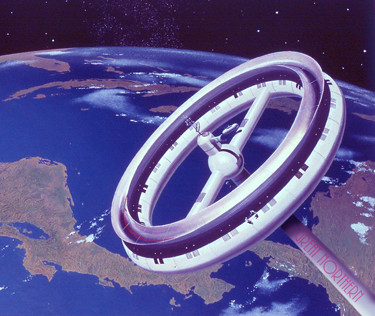
McCormick's Mill
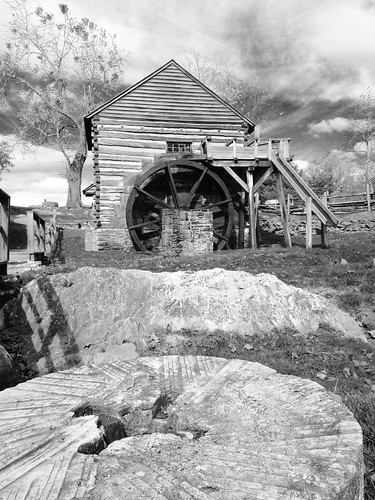
Robert McCormick's Mill. Photo by Bob Kirchman.
Changing the World
from Steele's Tavern, Virginia
[Click to read]
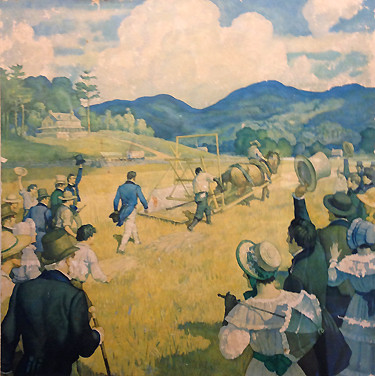
The WORLD'S FIRST REAPER
Public test of CYRUS HALL McCORMICK'S Invention
Steele's Tavern, Virginia, July 1831
International Harvester Archives.
Cyrus Hall McCormick was born in 1809. He grew up on his family's 532-acre farm, "Walnut Grove", which was located north of Lexington, Virginia. As a boy, McCormick had a talent for both agriculture and inventing. At the age of 15, he invented a lightweight cradle for carting harvested grain (1824). Meanwhile, McCormick's father, Robert, was working in the farm's smithy on an invention of his own: a horse-drawn reaping machine. When Robert McCormick finally gave up on producing a working model, in the early fall of 1831, his son took over the challenge.
At that time, grain was harvested by the same manual process that had been used since the dawn of agriculture. The reapers mowed down the standing grain with a hand-swung scythe, and the binders followed behind them, tying the crop into bales, which were then carted away, usually for storage in barns. Because reaping was a much more painstaking process than sowing, even farmers with land and seed to spare were forced to limit their crop to what they could reap in a given season.
Using his father's incomplete model as a starting point, McCormick sketched out plans for a machine that would automatically cut, thresh, and bundle grain while being pulled through a field by horses. Within six weeks – before the 1831 harvest was over – he had built, field-tested, remodelled, and successfully demonstrated the world's first mechanical reaper to the public. McCormick had singlehandedly increased farms' potential yield at least tenfold, with minimal effort by farmers.
Astonishingly, they remained uninterested or at least unconvinced. For nine years, sales for the device were virtually zero. (Read More)
ZIMMERLOOPTM
The Future of Intercontinental Travel
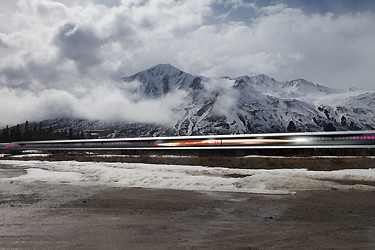
In this cutaway view, a HYPERLOOP capsule speeds through Alaska.
Graphic by Bob Kirchman.

Frederick Douglass
“What to the Slave Is the Fourth of July?”
July 5, 1852
Mr. President, Friends and Fellow Citizens:
He who could address this audience without a quailing sensation, has stronger nerves than I have. I do not remember ever to have appeared as a speaker before any assembly more shrinkingly, nor with greater distrust of my ability, than I do this day. A feeling has crept over me, quite unfavorable to the exercise of my limited powers of speech. The task before me is one which requires much previous thought and study for its proper performance. I know that apologies of this sort are generally considered flat and unmeaning. I trust, however, that mine will not be so considered. Should I seem at ease, my appearance would much misrepresent me. The little experience I have had in addressing public meetings, in country schoolhouses, avails me nothing on the present occasion.
The papers and placards say, that I am to deliver a 4th [of] July oration. This certainly sounds large, and out of the common way, for it is true that I have often had the privilege to speak in this beautiful Hall, and to address many who now honor me with their presence. But neither their familiar faces, nor the perfect gage I think I have of Corinthian Hall, seems to free me from embarrassment.
The fact is, ladies and gentlemen, the distance between this platform and the slave plantation, from which I escaped, is considerable — and the difficulties to be overcome in getting from the latter to the former, are by no means slight. That I am here to-day is, to me, a matter of astonishment as well as of gratitude. You will not, therefore, be surprised, if in what I have to say I evince no elaborate preparation, nor grace my speech with any high sounding exordium. With little experience and with less learning, I have been able to throw my thoughts hastily and imperfectly together; and trusting to your patient and generous indulgence, I will proceed to lay them before you.
This, for the purpose of this celebration, is the 4th of July. It is the birthday of your National Independence, and of your political freedom. This, to you, is what the Passover was to the emancipated people of God. It carries your minds back to the day, and to the act of your great deliverance; and to the signs, and to the wonders, associated with that act, and that day. This celebration also marks the beginning of another year of your national life; and reminds you that the Republic of America is now 76 years old. I am glad, fellow-citizens, that your nation is so young. Seventy-six years, though a good old age for a man, is but a mere speck in the life of a nation. Three score years and ten is the allotted time for individual men; but nations number their years by thousands. According to this fact, you are, even now, only in the beginning of your national career, still lingering in the period of childhood. I repeat, I am glad this is so. There is hope in the thought, and hope is much needed, under the dark clouds which lower above the horizon. The eye of the reformer is met with angry flashes, portending disastrous times; but his heart may well beat lighter at the thought that America is young, and that she is still in the impressible stage of her existence. May he not hope that high lessons of wisdom, of justice and of truth, will yet give direction to her destiny? Were the nation older, the patriot’s heart might be sadder, and the reformer’s brow heavier. Its future might be shrouded in gloom, and the hope of its prophets go out in sorrow. There is consolation in the thought that America is young. Great streams are not easily turned from channels, worn deep in the course of ages. They may sometimes rise in quiet and stately majesty, and inundate the land, refreshing and fertilizing the earth with their mysterious properties. They may also rise in wrath and fury, and bear away, on their angry waves, the accumulated wealth of years of toil and hardship. They, however, gradually flow back to the same old channel, and flow on as serenely as ever. But, while the river may not be turned aside, it may dry up, and leave nothing behind but the withered branch, and the unsightly rock, to howl in the abyss-sweeping wind, the sad tale of departed glory. As with rivers so with nations.
Fellow-citizens, I shall not presume to dwell at length on the associations that cluster about this day. The simple story of it is that, 76 years ago, the people of this country were British subjects. The style and title of your “sovereign people” (in which you now glory) was not then born. You were under the British Crown. Your fathers esteemed the English Government as the home government; and England as the fatherland. This home government, you know, although a considerable distance from your home, did, in the exercise of its parental prerogatives, impose upon its colonial children, such restraints, burdens and limitations, as, in its mature judgment, it deemed wise, right and proper.
But, your fathers, who had not adopted the fashionable idea of this day, of the infallibility of government, and the absolute character of its acts, presumed to differ from the home government in respect to the wisdom and the justice of some of those burdens and restraints. They went so far in their excitement as to pronounce the measures of government unjust, unreasonable, and oppressive, and altogether such as ought not to be quietly submitted to. I scarcely need say, fellow-citizens, that my opinion of those measures fully accords with that of your fathers. Such a declaration of agreement on my part would not be worth much to anybody. It would, certainly, prove nothing, as to what part I might have taken, had I lived during the great controversy of 1776. To say now that America was right, and England wrong, is exceedingly easy. Everybody can say it; the dastard, not less than the noble brave, can flippantly discant on the tyranny of England towards the American Colonies. It is fashionable to do so; but there was a time when to pronounce against England, and in favor of the cause of the colonies, tried men’s souls. They who did so were accounted in their day, plotters of mischief, agitators and rebels, dangerous men. To side with the right, against the wrong, with the weak against the strong, and with the oppressed against the oppressor! here lies the merit, and the one which, of all others, seems unfashionable in our day. The cause of liberty may be stabbed by the men who glory in the deeds of your fathers. But, to proceed.
Feeling themselves harshly and unjustly treated by the home government, your fathers, like men of honesty, and men of spirit, earnestly sought redress. They petitioned and remonstrated; they did so in a decorous, respectful, and loyal manner. Their conduct was wholly unexceptionable. This, however, did not answer the purpose. They saw themselves treated with sovereign indifference, coldness and scorn. Yet they persevered. They were not the men to look back.
As the sheet anchor takes a firmer hold, when the ship is tossed by the storm, so did the cause of your fathers grow stronger, as it breasted the chilling blasts of kingly displeasure. The greatest and best of British statesmen admitted its justice, and the loftiest eloquence of the British Senate came to its support. But, with that blindness which seems to be the unvarying characteristic of tyrants, since Pharaoh and his hosts were drowned in the Red Sea, the British Government persisted in the exactions complained of.
The madness of this course, we believe, is admitted now, even by England; but we fear the lesson is wholly lost on our present ruler.
Oppression makes a wise man mad. Your fathers were wise men, and if they did not go mad, they became restive under this treatment. They felt themselves the victims of grievous wrongs, wholly incurable in their colonial capacity. With brave men there is always a remedy for oppression. Just here, the idea of a total separation of the colonies from the crown was born! It was a startling idea, much more so, than we, at this distance of time, regard it. The timid and the prudent (as has been intimated) of that day, were, of course, shocked and alarmed by it.
Such people lived then, had lived before, and will, probably, ever have a place on this planet; and their course, in respect to any great change, (no matter how great the good to be attained, or the wrong to be redressed by it), may be calculated with as much precision as can be the course of the stars. They hate all changes, but silver, gold and copper change! Of this sort of change they are always strongly in favor.
These people were called Tories in the days of your fathers; and the appellation, probably, conveyed the same idea that is meant by a more modern, though a somewhat less euphonious term, which we often find in our papers, applied to some of our old politicians.
Their opposition to the then dangerous thought was earnest and powerful; but, amid all their terror and affrighted vociferations against it, the alarming and revolutionary idea moved on, and the country with it.
On the 2d of July, 1776, the old Continental Congress, to the dismay of the lovers of ease, and the worshipers of property, clothed that dreadful idea with all the authority of national sanction. They did so in the form of a resolution; and as we seldom hit upon resolutions, drawn up in our day whose transparency is at all equal to this, it may refresh your minds and help my story if I read it. “Resolved, That these united colonies are, and of right, ought to be free and Independent States; that they are absolved from all allegiance to the British Crown; and that all political connection between them and the State of Great Britain is, and ought to be, dissolved.”
Citizens, your fathers made good that resolution. They succeeded; and to-day you reap the fruits of their success. The freedom gained is yours; and you, therefore, may properly celebrate this anniversary. The 4th of July is the first great fact in your nation’s history — the very ring-bolt in the chain of your yet undeveloped destiny.
Pride and patriotism, not less than gratitude, prompt you to celebrate and to hold it in perpetual remembrance. I have said that the Declaration of Independence is the ring-bolt to the chain of your nation’s destiny; so, indeed, I regard it. The principles contained in that instrument are saving principles. Stand by those principles, be true to them on all occasions, in all places, against all foes, and at whatever cost.
From the round top of your ship of state, dark and threatening clouds may be seen. Heavy billows, like mountains in the distance, disclose to the leeward huge forms of flinty rocks! That bolt drawn, that chain broken, and all is lost. Cling to this day — cling to it, and to its principles, with the grasp of a storm-tossed mariner to a spar at midnight.
The coming into being of a nation, in any circumstances, is an interesting event. But, besides general considerations, there were peculiar circumstances which make the advent of this republic an event of special attractiveness.
The whole scene, as I look back to it, was simple, dignified and sublime.
The population of the country, at the time, stood at the insignificant number of three millions. The country was poor in the munitions of war. The population was weak and scattered, and the country a wilderness unsubdued. There were then no means of concert and combination, such as exist now. Neither steam nor lightning had then been reduced to order and discipline. From the Potomac to the Delaware was a journey of many days. Under these, and innumerable other disadvantages, your fathers declared for liberty and independence and triumphed.
Fellow Citizens, I am not wanting in respect for the fathers of this republic. The signers of the Declaration of Independence were brave men. They were great men too — great enough to give fame to a great age. It does not often happen to a nation to raise, at one time, such a number of truly great men. The point from which I am compelled to view them is not, certainly, the most favorable; and yet I cannot contemplate their great deeds with less than admiration. They were statesmen, patriots and heroes, and for the good they did, and the principles they contended for, I will unite with you to honor their memory.
They loved their country better than their own private interests; and, though this is not the highest form of human excellence, all will concede that it is a rare virtue, and that when it is exhibited, it ought to command respect. He who will, intelligently, lay down his life for his country, is a man whom it is not in human nature to despise. Your fathers staked their lives, their fortunes, and their sacred honor, on the cause of their country. In their admiration of liberty, they lost sight of all other interests.
They were peace men; but they preferred revolution to peaceful submission to bondage. They were quiet men; but they did not shrink from agitating against oppression. They showed forbearance; but that they knew its limits. They believed in order; but not in the order of tyranny. With them, nothing was “settled” that was not right. With them, justice, liberty and humanity were “final;” not slavery and oppression. You may well cherish the memory of such men. They were great in their day and generation. Their solid manhood stands out the more as we contrast it with these degenerate times.
How circumspect, exact and proportionate were all their movements! How unlike the politicians of an hour! Their statesmanship looked beyond the passing moment, and stretched away in strength into the distant future. They seized upon eternal principles, and set a glorious example in their defense. Mark them!
Fully appreciating the hardship to be encountered, firmly believing in the right of their cause, honorably inviting the scrutiny of an on-looking world, reverently appealing to heaven to attest their sincerity, soundly comprehending the solemn responsibility they were about to assume, wisely measuring the terrible odds against them, your fathers, the fathers of this republic, did, most deliberately, under the inspiration of a glorious patriotism, and with a sublime faith in the great principles of justice and freedom, lay deep the corner-stone of the national superstructure, which has risen and still rises in grandeur around you.
Of this fundamental work, this day is the anniversary. Our eyes are met with demonstrations of joyous enthusiasm. Banners and pennants wave exultingly on the breeze. The din of business, too, is hushed. Even Mammon seems to have quitted his grasp on this day. The ear-piercing fife and the stirring drum unite their accents with the ascending peal of a thousand church bells. Prayers are made, hymns are sung, and sermons are preached in honor of this day; while the quick martial tramp of a great and multitudinous nation, echoed back by all the hills, valleys and mountains of a vast continent, bespeak the occasion one of thrilling and universal interest — a nation’s jubilee.
Friends and citizens, I need not enter further into the causes which led to this anniversary. Many of you understand them better than I do. You could instruct me in regard to them. That is a branch of knowledge in which you feel, perhaps, a much deeper interest than your speaker. The causes which led to the separation of the colonies from the British crown have never lacked for a tongue. They have all been taught in your common schools, narrated at your firesides, unfolded from your pulpits, and thundered from your legislative halls, and are as familiar to you as household words. They form the staple of your national poetry and eloquence.
I remember, also, that, as a people, Americans are remarkably familiar with all facts which make in their own favor. This is esteemed by some as a national trait — perhaps a national weakness. It is a fact, that whatever makes for the wealth or for the reputation of Americans, and can be had cheap! will be found by Americans. I shall not be charged with slandering Americans, if I say I think the American side of any question may be safely left in American hands.
I leave, therefore, the great deeds of your fathers to other gentlemen whose claim to have been regularly descended will be less likely to be disputed than mine!
My business, if I have any here to-day, is with the present. The accepted time with God and his cause is the ever-living now.
Trust no future, however pleasant,
Let the dead past bury its dead;
Act, act in the living present,
Heart within, and God overhead.
We have to do with the past only as we can make it useful to the present and to the future. To all inspiring motives, to noble deeds which can be gained from the past, we are welcome. But now is the time, the important time. Your fathers have lived, died, and have done their work, and have done much of it well. You live and must die, and you must do your work. You have no right to enjoy a child’s share in the labor of your fathers, unless your children are to be blest by your labors. You have no right to wear out and waste the hard-earned fame of your fathers to cover your indolence. Sydney Smith tells us that men seldom eulogize the wisdom and virtues of their fathers, but to excuse some folly or wickedness of their own. This truth is not a doubtful one. There are illustrations of it near and remote, ancient and modern. It was fashionable, hundreds of years ago, for the children of Jacob to boast, we have “Abraham to our father,” when they had long lost Abraham’s faith and spirit. That people contented themselves under the shadow of Abraham’s great name, while they repudiated the deeds which made his name great. Need I remind you that a similar thing is being done all over this country to-day? Need I tell you that the Jews are not the only people who built the tombs of the prophets, and garnished the sepulchres of the righteous? Washington could not die till he had broken the chains of his slaves. Yet his monument is built up by the price of human blood, and the traders in the bodies and souls of men shout — “We have Washington to our father.” — Alas! that it should be so; yet so it is.
The evil that men do, lives after them, The good is oft-interred with their bones.
Fellow-citizens, pardon me, allow me to ask, why am I called upon to speak here to-day? What have I, or those I represent, to do with your national independence? Are the great principles of political freedom and of natural justice, embodied in that Declaration of Independence, extended to us? and am I, therefore, called upon to bring our humble offering to the national altar, and to confess the benefits and express devout gratitude for the blessings resulting from your independence to us?
Would to God, both for your sakes and ours, that an affirmative answer could be truthfully returned to these questions! Then would my task be light, and my burden easy and delightful. For who is there so cold, that a nation’s sympathy could not warm him? Who so obdurate and dead to the claims of gratitude, that would not thankfully acknowledge such priceless benefits? Who so stolid and selfish, that would not give his voice to swell the hallelujahs of a nation’s jubilee, when the chains of servitude had been torn from his limbs? I am not that man. In a case like that, the dumb might eloquently speak, and the “lame man leap as an hart.”
But, such is not the state of the case. I say it with a sad sense of the disparity between us. I am not included within the pale of this glorious anniversary! Your high independence only reveals the immeasurable distance between us. The blessings in which you, this day, rejoice, are not enjoyed in common. — The rich inheritance of justice, liberty, prosperity and independence, bequeathed by your fathers, is shared by you, not by me. The sunlight that brought life and healing to you, has brought stripes and death to me. This Fourth [of] July is yours, not mine. You may rejoice, I must mourn. To drag a man in fetters into the grand illuminated temple of liberty, and call upon him to join you in joyous anthems, were inhuman mockery and sacrilegious irony. Do you mean, citizens, to mock me, by asking me to speak to-day? If so, there is a parallel to your conduct. And let me warn you that it is dangerous to copy the example of a nation whose crimes, lowering up to heaven, were thrown down by the breath of the Almighty, burying that nation in irrecoverable ruin! I can to-day take up the plaintive lament of a peeled and woe-smitten people!
By the rivers of Babylon, there we sat down. Yea! we wept when we remembered Zion. We hanged our harps upon the willows in the midst thereof. For there, they that carried us away captive, required of us a song; and they who wasted us required of us mirth, saying, Sing us one of the songs of Zion. How can we sing the Lord’s song in a strange land? If I forget thee, O Jerusalem, let my right hand forget her cunning. If I do not remember thee, let my tongue cleave to the roof of my mouth.”
Fellow-citizens; above your national, tumultuous joy, I hear the mournful wail of millions! whose chains, heavy and grievous yesterday, are, to-day, rendered more intolerable by the jubilee shouts that reach them. If I do forget, if I do not faithfully remember those bleeding children of sorrow this day, “may my right hand forget her cunning, and may my tongue cleave to the roof of my mouth!” To forget them, to pass lightly over their wrongs, and to chime in with the popular theme, would be treason most scandalous and shocking, and would make me a reproach before God and the world. My subject, then fellow-citizens, is AMERICAN SLAVERY. I shall see, this day, and its popular characteristics, from the slave’s point of view. Standing, there, identified with the American bondman, making his wrongs mine, I do not hesitate to declare, with all my soul, that the character and conduct of this nation never looked blacker to me than on this 4th of July! Whether we turn to the declarations of the past, or to the professions of the present, the conduct of the nation seems equally hideous and revolting. America is false to the past, false to the present, and solemnly binds herself to be false to the future. Standing with God and the crushed and bleeding slave on this occasion, I will, in the name of humanity which is outraged, in the name of liberty which is fettered, in the name of the constitution and the Bible, which are disregarded and trampled upon, dare to call in question and to denounce, with all the emphasis I can command, everything that serves to perpetuate slavery — the great sin and shame of America! “I will not equivocate; I will not excuse;” I will use the severest language I can command; and yet not one word shall escape me that any man, whose judgment is not blinded by prejudice, or who is not at heart a slaveholder, shall not confess to be right and just.
But I fancy I hear some one of my audience say, it is just in this circumstance that you and your brother abolitionists fail to make a favorable impression on the public mind. Would you argue more, and denounce less, would you persuade more, and rebuke less, your cause would be much more likely to succeed. But, I submit, where all is plain there is nothing to be argued. What point in the anti-slavery creed would you have me argue? On what branch of the subject do the people of this country need light? Must I undertake to prove that the slave is a man? That point is conceded already. Nobody doubts it. The slaveholders themselves acknowledge it in the enactment of laws for their government. They acknowledge it when they punish disobedience on the part of the slave. There are seventy-two crimes in the State of Virginia, which, if committed by a black man, (no matter how ignorant he be), subject him to the punishment of death; while only two of the same crimes will subject a white man to the like punishment. What is this but the acknowledgement that the slave is a moral, intellectual and responsible being? The manhood of the slave is conceded. It is admitted in the fact that Southern statute books are covered with enactments forbidding, under severe fines and penalties, the teaching of the slave to read or to write. When you can point to any such laws, in reference to the beasts of the field, then I may consent to argue the manhood of the slave. When the dogs in your streets, when the fowls of the air, when the cattle on your hills, when the fish of the sea, and the reptiles that crawl, shall be unable to distinguish the slave from a brute, then will I argue with you that the slave is a man!
For the present, it is enough to affirm the equal manhood of the Negro race. Is it not astonishing that, while we are ploughing, planting and reaping, using all kinds of mechanical tools, erecting houses, constructing bridges, building ships, working in metals of brass, iron, copper, silver and gold; that, while we are reading, writing and cyphering, acting as clerks, merchants and secretaries, having among us lawyers, doctors, ministers, poets, authors, editors, orators and teachers; that, while we are engaged in all manner of enterprises common to other men, digging gold in California, capturing the whale in the Pacific, feeding sheep and cattle on the hill-side, living, moving, acting, thinking, planning, living in families as husbands, wives and children, and, above all, confessing and worshipping the Christian’s God, and looking hopefully for life and immortality beyond the grave, we are called upon to prove that we are men!
Would you have me argue that man is entitled to liberty? that he is the rightful owner of his own body? You have already declared it. Must I argue the wrongfulness of slavery? Is that a question for Republicans? Is it to be settled by the rules of logic and argumentation, as a matter beset with great difficulty, involving a doubtful application of the principle of justice, hard to be understood? How should I look to-day, in the presence of Americans, dividing, and subdividing a discourse, to show that men have a natural right to freedom? speaking of it relatively, and positively, negatively, and affirmatively. To do so, would be to make myself ridiculous, and to offer an insult to your understanding. — There is not a man beneath the canopy of heaven, that does not know that slavery is wrong for him.
What, am I to argue that it is wrong to make men brutes, to rob them of their liberty, to work them without wages, to keep them ignorant of their relations to their fellow men, to beat them with sticks, to flay their flesh with the lash, to load their limbs with irons, to hunt them with dogs, to sell them at auction, to sunder their families, to knock out their teeth, to burn their flesh, to starve them into obedience and submission to their masters? Must I argue that a system thus marked with blood, and stained with pollution, is wrong? No! I will not. I have better employments for my time and strength than such arguments would imply.
What, then, remains to be argued? Is it that slavery is not divine; that God did not establish it; that our doctors of divinity are mistaken? There is blasphemy in the thought. That which is inhuman, cannot be divine! Who can reason on such a proposition? They that can, may; I cannot. The time for such argument is passed.
At a time like this, scorching irony, not convincing argument, is needed. O! had I the ability, and could I reach the nation’s ear, I would, to-day, pour out a fiery stream of biting ridicule, blasting reproach, withering sarcasm, and stern rebuke. For it is not light that is needed, but fire; it is not the gentle shower, but thunder. We need the storm, the whirlwind, and the earthquake. The feeling of the nation must be quickened; the conscience of the nation must be roused; the propriety of the nation must be startled; the hypocrisy of the nation must be exposed; and its crimes against God and man must be proclaimed and denounced.
What, to the American slave, is your 4th of July? I answer: a day that reveals to him, more than all other days in the year, the gross injustice and cruelty to which he is the constant victim. To him, your celebration is a sham; your boasted liberty, an unholy license; your national greatness, swelling vanity; your sounds of rejoicing are empty and heartless; your denunciations of tyrants, brass fronted impudence; your shouts of liberty and equality, hollow mockery; your prayers and hymns, your sermons and thanksgivings, with all your religious parade, and solemnity, are, to him, mere bombast, fraud, deception, impiety, and hypocrisy — a thin veil to cover up crimes which would disgrace a nation of savages. There is not a nation on the earth guilty of practices, more shocking and bloody, than are the people of these United States, at this very hour.
Go where you may, search where you will, roam through all the monarchies and despotisms of the old world, travel through South America, search out every abuse, and when you have found the last, lay your facts by the side of the everyday practices of this nation, and you will say with me, that, for revolting barbarity and shameless hypocrisy, America reigns without a rival.
Take the American slave-trade, which, we are told by the papers, is especially prosperous just now. Ex-Senator Benton tells us that the price of men was never higher than now. He mentions the fact to show that slavery is in no danger. This trade is one of the peculiarities of American institutions. It is carried on in all the large towns and cities in one-half of this confederacy; and millions are pocketed every year, by dealers in this horrid traffic. In several states, this trade is a chief source of wealth. It is called (in contradistinction to the foreign slave-trade) “the internal slave trade.” It is, probably, called so, too, in order to divert from it the horror with which the foreign slave-trade is contemplated. That trade has long since been denounced by this government, as piracy. It has been denounced with burning words, from the high places of the nation, as an execrable traffic. To arrest it, to put an end to it, this nation keeps a squadron, at immense cost, on the coast of Africa. Everywhere, in this country, it is safe to speak of this foreign slave-trade, as a most inhuman traffic, opposed alike to the laws of God and of man. The duty to extirpate and destroy it, is admitted even by our DOCTORS OF DIVINITY. In order to put an end to it, some of these last have consented that their colored brethren (nominally free) should leave this country, and establish themselves on the western coast of Africa! It is, however, a notable fact that, while so much execration is poured out by Americans upon those engaged in the foreign slave-trade, the men engaged in the slave-trade between the states pass without condemnation, and their business is deemed honorable.
Behold the practical operation of this internal slave-trade, the American slave-trade, sustained by American politics and America religion. Here you will see men and women reared like swine for the market. You know what is a swine-drover? I will show you a man-drover. They inhabit all our Southern States. They perambulate the country, and crowd the highways of the nation, with droves of human stock. You will see one of these human flesh-jobbers, armed with pistol, whip and bowie-knife, driving a company of a hundred men, women, and children, from the Potomac to the slave market at New Orleans. These wretched people are to be sold singly, or in lots, to suit purchasers. They are food for the cotton-field, and the deadly sugar-mill. Mark the sad procession, as it moves wearily along, and the inhuman wretch who drives them. Hear his savage yells and his blood-chilling oaths, as he hurries on his affrighted captives! There, see the old man, with locks thinned and gray. Cast one glance, if you please, upon that young mother, whose shoulders are bare to the scorching sun, her briny tears falling on the brow of the babe in her arms. See, too, that girl of thirteen, weeping, yes! weeping, as she thinks of the mother from whom she has been torn! The drove moves tardily. Heat and sorrow have nearly consumed their strength; suddenly you hear a quick snap, like the discharge of a rifle; the fetters clank, and the chain rattles simultaneously; your ears are saluted with a scream, that seems to have torn its way to the center of your soul! The crack you heard, was the sound of the slave-whip; the scream you heard, was from the woman you saw with the babe. Her speed had faltered under the weight of her child and her chains! that gash on her shoulder tells her to move on. Follow the drove to New Orleans. Attend the auction; see men examined like horses; see the forms of women rudely and brutally exposed to the shocking gaze of American slave-buyers. See this drove sold and separated forever; and never forget the deep, sad sobs that arose from that scattered multitude. Tell me citizens, WHERE, under the sun, you can witness a spectacle more fiendish and shocking. Yet this is but a glance at the American slave-trade, as it exists, at this moment, in the ruling part of the United States.
I was born amid such sights and scenes. To me the American slave-trade is a terrible reality. When a child, my soul was often pierced with a sense of its horrors. I lived on Philpot Street, Fell’s Point, Baltimore, and have watched from the wharves, the slave ships in the Basin, anchored from the shore, with their cargoes of human flesh, waiting for favorable winds to waft them down the Chesapeake. There was, at that time, a grand slave mart kept at the head of Pratt Street, by Austin Woldfolk. His agents were sent into every town and county in Maryland, announcing their arrival, through the papers, and on flaming “hand-bills,” headed CASH FOR NEGROES. These men were generally well dressed men, and very captivating in their manners. Ever ready to drink, to treat, and to gamble. The fate of many a slave has depended upon the turn of a single card; and many a child has been snatched from the arms of its mother by bargains arranged in a state of brutal drunkenness.
The flesh-mongers gather up their victims by dozens, and drive them, chained, to the general depot at Baltimore. When a sufficient number have been collected here, a ship is chartered, for the purpose of conveying the forlorn crew to Mobile, or to New Orleans. From the slave prison to the ship, they are usually driven in the darkness of night; for since the antislavery agitation, a certain caution is observed.
In the deep still darkness of midnight, I have been often aroused by the dead heavy footsteps, and the piteous cries of the chained gangs that passed our door. The anguish of my boyish heart was intense; and I was often consoled, when speaking to my mistress in the morning, to hear her say that the custom was very wicked; that she hated to hear the rattle of the chains, and the heart-rending cries. I was glad to find one who sympathized with me in my horror.
Fellow-citizens, this murderous traffic is, to-day, in active operation in this boasted republic. In the solitude of my spirit, I see clouds of dust raised on the highways of the South; I see the bleeding footsteps; I hear the doleful wail of fettered humanity, on the way to the slave-markets, where the victims are to be sold like horses, sheep, and swine, knocked off to the highest bidder. There I see the tenderest ties ruthlessly broken, to gratify the lust, caprice and rapacity of the buyers and sellers of men. My soul sickens at the sight.
Is this the land your Fathers loved,
The freedom which they toiled to win?
Is this the earth whereon they moved?
Are these the graves they slumber in?
But a still more inhuman, disgraceful, and scandalous state of things remains to be presented. By an act of the American Congress, not yet two years old, slavery has been nationalized in its most horrible and revolting form. By that act, Mason and Dixon’s line has been obliterated; New York has become as Virginia; and the power to hold, hunt, and sell men, women, and children as slaves remains no longer a mere state institution, but is now an institution of the whole United States. The power is co-extensive with the Star-Spangled Banner and American Christianity. Where these go, may also go the merciless slave-hunter. Where these are, man is not sacred. He is a bird for the sportsman’s gun. By that most foul and fiendish of all human decrees, the liberty and person of every man are put in peril. Your broad republican domain is hunting ground for men. Not for thieves and robbers, enemies of society, merely, but for men guilty of no crime. Your lawmakers have commanded all good citizens to engage in this hellish sport. Your President, your Secretary of State, our lords, nobles, and ecclesiastics, enforce, as a duty you owe to your free and glorious country, and to your God, that you do this accursed thing. Not fewer than forty Americans have, within the past two years, been hunted down and, without a moment’s warning, hurried away in chains, and consigned to slavery and excruciating torture. Some of these have had wives and children, dependent on them for bread; but of this, no account was made. The right of the hunter to his prey stands superior to the right of marriage, and to all rights in this republic, the rights of God included! For black men there are neither law, justice, humanity, not religion. The Fugitive Slave Law makes mercy to them a crime; and bribes the judge who tries them. An American judge gets ten dollars for every victim he consigns to slavery, and five, when he fails to do so. The oath of any two villains is sufficient, under this hell-black enactment, to send the most pious and exemplary black man into the remorseless jaws of slavery! His own testimony is nothing. He can bring no witnesses for himself. The minister of American justice is bound by the law to hear but one side; and that side, is the side of the oppressor. Let this damning fact be perpetually told. Let it be thundered around the world, that, in tyrant-killing, king-hating, people-loving, democratic, Christian America, the seats of justice are filled with judges, who hold their offices under an open and palpable bribe, and are bound, in deciding in the case of a man’s liberty, hear only his accusers!
In glaring violation of justice, in shameless disregard of the forms of administering law, in cunning arrangement to entrap the defenseless, and in diabolical intent, this Fugitive Slave Law stands alone in the annals of tyrannical legislation. I doubt if there be another nation on the globe, having the brass and the baseness to put such a law on the statute-book. If any man in this assembly thinks differently from me in this matter, and feels able to disprove my statements, I will gladly confront him at any suitable time and place he may select.
I take this law to be one of the grossest infringements of Christian Liberty, and, if the churches and ministers of our country were not stupidly blind, or most wickedly indifferent, they, too, would so regard it.
At the very moment that they are thanking God for the enjoyment of civil and religious liberty, and for the right to worship God according to the dictates of their own consciences, they are utterly silent in respect to a law which robs religion of its chief significance, and makes it utterly worthless to a world lying in wickedness. Did this law concern the “mint, anise, and cumin” — abridge the right to sing psalms, to partake of the sacrament, or to engage in any of the ceremonies of religion, it would be smitten by the thunder of a thousand pulpits. A general shout would go up from the church, demanding repeal, repeal, instant repeal! — And it would go hard with that politician who presumed to solicit the votes of the people without inscribing this motto on his banner. Further, if this demand were not complied with, another Scotland would be added to the history of religious liberty, and the stern old Covenanters would be thrown into the shade. A John Knox would be seen at every church door, and heard from every pulpit, and Fillmore would have no more quarter than was shown by Knox, to the beautiful, but treacherous queen Mary of Scotland. The fact that the church of our country, (with fractional exceptions), does not esteem “the Fugitive Slave Law” as a declaration of war against religious liberty, implies that that church regards religion simply as a form of worship, an empty ceremony, and not a vital principle, requiring active benevolence, justice, love and good will towards man. It esteems sacrifice above mercy; psalm-singing above right doing; solemn meetings above practical righteousness. A worship that can be conducted by persons who refuse to give shelter to the houseless, to give bread to the hungry, clothing to the naked, and who enjoin obedience to a law forbidding these acts of mercy, is a curse, not a blessing to mankind. The Bible addresses all such persons as “scribes, Pharisees, hypocrites, who pay tithe of mint, anise, and cumin, and have omitted the weightier matters of the law, judgment, mercy and faith.”
But the church of this country is not only indifferent to the wrongs of the slave, it actually takes sides with the oppressors. It has made itself the bulwark of American slavery, and the shield of American slave-hunters. Many of its most eloquent Divines. who stand as the very lights of the church, have shamelessly given the sanction of religion and the Bible to the whole slave system. They have taught that man may, properly, be a slave; that the relation of master and slave is ordained of God; that to send back an escaped bondman to his master is clearly the duty of all the followers of the Lord Jesus Christ; and this horrible blasphemy is palmed off upon the world for Christianity.
For my part, I would say, welcome infidelity! welcome atheism! welcome anything! in preference to the gospel, as preached by those Divines! They convert the very name of religion into an engine of tyranny, and barbarous cruelty, and serve to confirm more infidels, in this age, than all the infidel writings of Thomas Paine, Voltaire, and Bolingbroke, put together, have done! These ministers make religion a cold and flinty-hearted thing, having neither principles of right action, nor bowels of compassion. They strip the love of God of its beauty, and leave the throng of religion a huge, horrible, repulsive form. It is a religion for oppressors, tyrants, man-stealers, and thugs. It is not that “pure and undefiled religion” which is from above, and which is “first pure, then peaceable, easy to be entreated, full of mercy and good fruits, without partiality, and without hypocrisy.” But a religion which favors the rich against the poor; which exalts the proud above the humble; which divides mankind into two classes, tyrants and slaves; which says to the man in chains, stay there; and to the oppressor, oppress on; it is a religion which may be professed and enjoyed by all the robbers and enslavers of mankind; it makes God a respecter of persons, denies his fatherhood of the race, and tramples in the dust the great truth of the brotherhood of man. All this we affirm to be true of the popular church, and the popular worship of our land and nation — a religion, a church, and a worship which, on the authority of inspired wisdom, we pronounce to be an abomination in the sight of God. In the language of Isaiah, the American church might be well addressed, “Bring no more vain ablations; incense is an abomination unto me: the new moons and Sabbaths, the calling of assemblies, I cannot away with; it is iniquity even the solemn meeting. Your new moons and your appointed feasts my soul hateth. They are a trouble to me; I am weary to bear them; and when ye spread forth your hands I will hide mine eyes from you. Yea! when ye make many prayers, I will not hear. YOUR HANDS ARE FULL OF BLOOD; cease to do evil, learn to do well; seek judgment; relieve the oppressed; judge for the fatherless; plead for the widow.”
The American church is guilty, when viewed in connection with what it is doing to uphold slavery; but it is superlatively guilty when viewed in connection with its ability to abolish slavery. The sin of which it is guilty is one of omission as well as of commission. Albert Barnes but uttered what the common sense of every man at all observant of the actual state of the case will receive as truth, when he declared that “There is no power out of the church that could sustain slavery an hour, if it were not sustained in it.”
Let the religious press, the pulpit, the Sunday school, the conference meeting, the great ecclesiastical, missionary, Bible and tract associations of the land array their immense powers against slavery and slave-holding; and the whole system of crime and blood would be scattered to the winds; and that they do not do this involves them in the most awful responsibility of which the mind can conceive.
In prosecuting the anti-slavery enterprise, we have been asked to spare the church, to spare the ministry; but how, we ask, could such a thing be done? We are met on the threshold of our efforts for the redemption of the slave, by the church and ministry of the country, in battle arrayed against us; and we are compelled to fight or flee. From what quarter, I beg to know, has proceeded a fire so deadly upon our ranks, during the last two years, as from the Northern pulpit? As the champions of oppressors, the chosen men of American theology have appeared — men, honored for their so-called piety, and their real learning. The Lords of Buffalo, the Springs of New York, the Lathrops of Auburn, the Coxes and Spencers of Brooklyn, the Gannets and Sharps of Boston, the Deweys of Washington, and other great religious lights of the land have, in utter denial of the authority of Him by whom they professed to be called to the ministry, deliberately taught us, against the example or the Hebrews and against the remonstrance of the Apostles, they teach that we ought to obey man’s law before the law of God.
My spirit wearies of such blasphemy; and how such men can be supported, as the “standing types and representatives of Jesus Christ,” is a mystery which I leave others to penetrate. In speaking of the American church, however, let it be distinctly understood that I mean the great mass of the religious organizations of our land. There are exceptions, and I thank God that there are. Noble men may be found, scattered all over these Northern States, of whom Henry Ward Beecher of Brooklyn, Samuel J. May of Syracuse, and my esteemed friend (Rev. R. R. Raymond) on the platform, are shining examples; and let me say further, that upon these men lies the duty to inspire our ranks with high religious faith and zeal, and to cheer us on in the great mission of the slave’s redemption from his chains.
One is struck with the difference between the attitude of the American church towards the anti-slavery movement, and that occupied by the churches in England towards a similar movement in that country. There, the church, true to its mission of ameliorating, elevating, and improving the condition of mankind, came forward promptly, bound up the wounds of the West Indian slave, and restored him to his liberty. There, the question of emancipation was a high religious question. It was demanded, in the name of humanity, and according to the law of the living God. The Sharps, the Clarksons, the Wilberforces, the Buxtons, and Burchells and the Knibbs, were alike famous for their piety, and for their philanthropy. The anti-slavery movement there was not an anti-church movement, for the reason that the church took its full share in prosecuting that movement: and the anti-slavery movement in this country will cease to be an anti-church movement, when the church of this country shall assume a favorable, instead of a hostile position towards that movement. Americans! your republican politics, not less than your republican religion, are flagrantly inconsistent. You boast of your love of liberty, your superior civilization, and your pure Christianity, while the whole political power of the nation (as embodied in the two great political parties), is solemnly pledged to support and perpetuate the enslavement of three millions of your countrymen. You hurl your anathemas at the crowned headed tyrants of Russia and Austria, and pride yourselves on your Democratic institutions, while you yourselves consent to be the mere tools and body-guards of the tyrants of Virginia and Carolina. You invite to your shores fugitives of oppression from abroad, honor them with banquets, greet them with ovations, cheer them, toast them, salute them, protect them, and pour out your money to them like water; but the fugitives from your own land you advertise, hunt, arrest, shoot and kill. You glory in your refinement and your universal education yet you maintain a system as barbarous and dreadful as ever stained the character of a nation — a system begun in avarice, supported in pride, and perpetuated in cruelty. You shed tears over fallen Hungary, and make the sad story of her wrongs the theme of your poets, statesmen and orators, till your gallant sons are ready to fly to arms to vindicate her cause against her oppressors; but, in regard to the ten thousand wrongs of the American slave, you would enforce the strictest silence, and would hail him as an enemy of the nation who dares to make those wrongs the subject of public discourse! You are all on fire at the mention of liberty for France or for Ireland; but are as cold as an iceberg at the thought of liberty for the enslaved of America. You discourse eloquently on the dignity of labor; yet, you sustain a system which, in its very essence, casts a stigma upon labor. You can bare your bosom to the storm of British artillery to throw off a threepenny tax on tea; and yet wring the last hard-earned farthing from the grasp of the black laborers of your country. You profess to believe “that, of one blood, God made all nations of men to dwell on the face of all the earth,” and hath commanded all men, everywhere to love one another; yet you notoriously hate, (and glory in your hatred), all men whose skins are not colored like your own. You declare, before the world, and are understood by the world to declare, that you “hold these truths to be self evident, that all men are created equal; and are endowed by their Creator with certain inalienable rights; and that, among these are, life, liberty, and the pursuit of happiness;” and yet, you hold securely, in a bondage which, according to your own Thomas Jefferson, “is worse than ages of that which your fathers rose in rebellion to oppose,” a seventh part of the inhabitants of your country.
Fellow-citizens! I will not enlarge further on your national inconsistencies. The existence of slavery in this country brands your republicanism as a sham, your humanity as a base pretence, and your Christianity as a lie. It destroys your moral power abroad; it corrupts your politicians at home. It saps the foundation of religion; it makes your name a hissing, and a bye-word to a mocking earth. It is the antagonistic force in your government, the only thing that seriously disturbs and endangers your Union. It fetters your progress; it is the enemy of improvement, the deadly foe of education; it fosters pride; it breeds insolence; it promotes vice; it shelters crime; it is a curse to the earth that supports it; and yet, you cling to it, as if it were the sheet anchor of all your hopes. Oh! be warned! be warned! a horrible reptile is coiled up in your nation’s bosom; the venomous creature is nursing at the tender breast of your youthful republic; for the love of God, tear away, and fling from you the hideous monster, and let the weight of twenty millions crush and destroy it forever!
But it is answered in reply to all this, that precisely what I have now denounced is, in fact, guaranteed and sanctioned by the Constitution of the United States; that the right to hold and to hunt slaves is a part of that Constitution framed by the illustrious Fathers of this Republic.
Then, I dare to affirm, notwithstanding all I have said before, your fathers stooped, basely stooped
To palter with us in a double sense:
And keep the word of promise to the ear,
But break it to the heart.
And instead of being the honest men I have before declared them to be, they were the veriest imposters that ever practiced on mankind. This is the inevitable conclusion, and from it there is no escape. But I differ from those who charge this baseness on the framers of the Constitution of the United States. It is a slander upon their memory, at least, so I believe. There is not time now to argue the constitutional question at length — nor have I the ability to discuss it as it ought to be discussed. The subject has been handled with masterly power by Lysander Spooner, Esq., by William Goodell, by Samuel E. Sewall, Esq., and last, though not least, by Gerritt Smith, Esq. These gentlemen have, as I think, fully and clearly vindicated the Constitution from any design to support slavery for an hour.
Fellow-citizens! there is no matter in respect to which, the people of the North have allowed themselves to be so ruinously imposed upon, as that of the pro-slavery character of the Constitution. In that instrument I hold there is neither warrant, license, nor sanction of the hateful thing; but, interpreted as it ought to be interpreted, the Constitution is a GLORIOUS LIBERTY DOCUMENT. Read its preamble, consider its purposes. Is slavery among them? Is it at the gateway? or is it in the temple? It is neither. While I do not intend to argue this question on the present occasion, let me ask, if it be not somewhat singular that, if the Constitution were intended to be, by its framers and adopters, a slave-holding instrument, why neither slavery, slaveholding, nor slave can anywhere be found in it. What would be thought of an instrument, drawn up, legally drawn up, for the purpose of entitling the city of Rochester to a track of land, in which no mention of land was made? Now, there are certain rules of interpretation, for the proper understanding of all legal instruments. These rules are well established. They are plain, common-sense rules, such as you and I, and all of us, can understand and apply, without having passed years in the study of law. I scout the idea that the question of the constitutionality or unconstitutionality of slavery is not a question for the people. I hold that every American citizen has a right to form an opinion of the constitution, and to propagate that opinion, and to use all honorable means to make his opinion the prevailing one. Without this right, the liberty of an American citizen would be as insecure as that of a Frenchman. Ex-Vice-President Dallas tells us that the Constitution is an object to which no American mind can be too attentive, and no American heart too devoted. He further says, the Constitution, in its words, is plain and intelligible, and is meant for the home-bred, unsophisticated understandings of our fellow-citizens. Senator Berrien tell us that the Constitution is the fundamental law, that which controls all others. The charter of our liberties, which every citizen has a personal interest in understanding thoroughly. The testimony of Senator Breese, Lewis Cass, and many others that might be named, who are everywhere esteemed as sound lawyers, so regard the constitution. I take it, therefore, that it is not presumption in a private citizen to form an opinion of that instrument.
Now, take the Constitution according to its plain reading, and I defy the presentation of a single pro-slavery clause in it. On the other hand it will be found to contain principles and purposes, entirely hostile to the existence of slavery.
I have detained my audience entirely too long already. At some future period I will gladly avail myself of an opportunity to give this subject a full and fair discussion.
Allow me to say, in conclusion, notwithstanding the dark picture I have this day presented of the state of the nation, I do not despair of this country. There are forces in operation, which must inevitably work the downfall of slavery. “The arm of the Lord is not shortened,” and the doom of slavery is certain. I, therefore, leave off where I began, with hope. While drawing encouragement from the Declaration of Independence, the great principles it contains, and the genius of American Institutions, my spirit is also cheered by the obvious tendencies of the age. Nations do not now stand in the same relation to each other that they did ages ago. No nation can now shut itself up from the surrounding world, and trot round in the same old path of its fathers without interference. The time was when such could be done. Long established customs of hurtful character could formerly fence themselves in, and do their evil work with social impunity. Knowledge was then confined and enjoyed by the privileged few, and the multitude walked on in mental darkness. But a change has now come over the affairs of mankind. Walled cities and empires have become unfashionable. The arm of commerce has borne away the gates of the strong city. Intelligence is penetrating the darkest corners of the globe. It makes its pathway over and under the sea, as well as on the earth. Wind, steam, and lightning are its chartered agents. Oceans no longer divide, but link nations together. From Boston to London is now a holiday excursion. Space is comparatively annihilated. Thoughts expressed on one side of the Atlantic, are distinctly heard on the other. The far off and almost fabulous Pacific rolls in grandeur at our feet. The Celestial Empire, the mystery of ages, is being solved. The fiat of the Almighty, “Let there be Light,” has not yet spent its force. No abuse, no outrage whether in taste, sport or avarice, can now hide itself from the all-pervading light. The iron shoe, and crippled foot of China must be seen, in contrast with nature. Africa must rise and put on her yet unwoven garment. “Ethiopia shall stretch out her hand unto God.” In the fervent aspirations of William Lloyd Garrison, I say, and let every heart join in saying it:
God speed the year of jubilee
The wide world o’er
When from their galling chains set free,
Th’ oppress’d shall vilely bend the knee,
And wear the yoke of tyranny
Like brutes no more.
That year will come, and freedom’s reign,
To man his plundered fights again
Restore.
God speed the day when human blood
Shall cease to flow!
In every clime be understood,
The claims of human brotherhood,
And each return for evil, good,
Not blow for blow;
That day will come all feuds to end.
And change into a faithful friend
Each foe.
God speed the hour, the glorious hour,
When none on earth
Shall exercise a lordly power,
Nor in a tyrant’s presence cower;
But all to manhood’s stature tower,
By equal birth!
That hour will come, to each, to all,
And from his prison-house, the thrall
Go forth.
Until that year, day, hour, arrive,
With head, and heart, and hand I’ll strive,
To break the rod, and rend the gyve,
The spoiler of his prey deprive —
So witness Heaven!
And never from my chosen post,
Whate’er the peril or the cost,
Be driven.
Source: Frederick Douglass: Selected Speeches and Writings, ed. Philip S. Foner (Chicago: Lawrence Hill, 1999), 188-206.
Biospheres and Tundra FarmsArctic Greenhouse Agriculture Prototypes
Copyright © 2016, The Kirchman Studio, all rights reserved
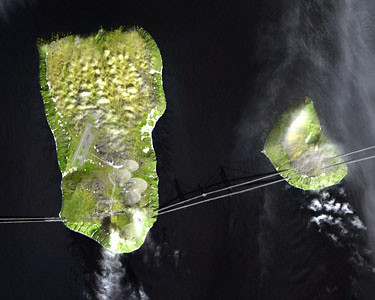
Here in this satellite view of Big Diomede, the biospheres have been added by the artist.
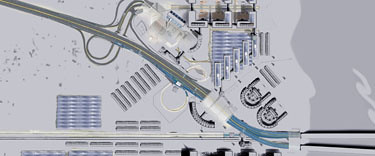
Greenhouses are visible in the Russian Terminus Rendering.

Here is the artist's view of the Big Diomede Biosphere Interchange on A2. Greenhouses and a portion of the biosphere complex are visible, as is the 'Unisphere' recreation that marks the 'End of the World.'
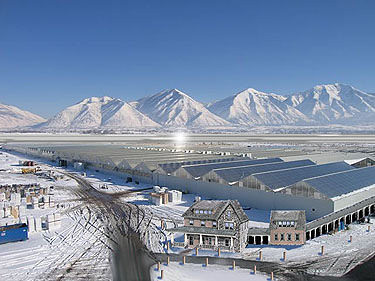
A Concept for a Tundra Greenhouse Farm.
As Joe and Chris had pushed on through the Yukon Territory on A2, they had seen the glimmer of reflected sunlight from Elizabeth's latest initiative... tundra greenhouses. The soil of the tundra had long been known to be extremely fertile but since it was frozen most of the year all that grew there was low scrubby vegetation. Martin pointed out that there was an abundance of geothermal energy in the same vicinity as the fertile tundra. All you had to do was drill for it. With an abundance of oil and gas companies flocking to the region, you simply paid them to sink your wells as a 'side job.' Hot water and steam gushing from deep in the Earth powered turbines to generate electricity, extending the growing season with artificial sunlight. Next it was used to heat the greenhouses and warm the topsoil so it could be cultivated. Finally the cooled water was used to irrigate crops, sinking back into the tundra so the process could be repeated.
Environmental 'protectors' in the lower 48 cried 'foul,' but their own data actually proved you could turn most of Siberia and the Northwest Territories into farms without making a dent in the Earth's temperature balance. The change was not without precedent. In the late Nineteenth Century the American West had been transformed into the breadbasket of the world. Immigrants fleeing famine joined with adventure seekers and restless pioneers to build this new world. Disney's Main Street was but a faint allusion to the energy of these communities as they had faced the frontier with little else than determination and faith. Faith, in the end, was the nutrient that kept them strong. Rupert's shipbuilding friends were happy to fabricate greenhouses fit to withstand the snow loads as his great bridge and the support buildings necessary for it were nearing completion. His Swedish friend followed in the path of Sears Roebuck in providing fine houses for the pioneers. On Martin O'Malley's drawing boards were plans for a new world to take shape in the Twenty-first Century. A world wracked by war and famine eagerly awaited it.
Elizabeth's vision would bring people presently crammed into refugee camps to work the soil inside her greenhouses. The Bering Strait highways would become a conduit for them to feed their homelands. All this would require the participation of thousands of souls who would plant, cultivate, harvest, drive trucks and provide necessary services for those involved in these activities. Coptic Egyptians, now living free of persecution, populated one of the first villages. Their rich Orthodox Church seemed right at home among the vestiges of Russian America. Sumatran Muslims who had made their fortunes working away from home on cruise ships now were able to make a living with their families intact in their own little community.
Elizabeth followed the example of Nineteenth Century America in broadcasting the little groups in such a way that they would need to cooperate with other communities while they enjoyed the familiarity of their own. Perhaps ths sharing in taming hostile wilderness is one of the Divine's greatest gifts to mankind in that they learn to work together. Joe and Chris had stopped to help Abdul change a tire earlier in the day. Men of two different cultures, they were brought together by a common struggle -- the struggle for survival on that hostile road. Chris had never spent time with a Turk before, but Joe remembered when his Grandfather, a NASA engineer in the 1960's had worked with a man from Ankarah named Ali. Ali was the son of Turkish immigrants and was a fellow engineer. Joe's Grandmother had learned what foods to avoid serving as the men shared each other's homes in hospitality." -- From PONTIFUS
Copyright © 2016, The Kirchman Studio, all rights reserved
The vision for Arctic farming has been shared in articles such as this one: Farming in the Arctic, It Can Be Done [click to read]. At the present it is not done on a large scale, but projects such as one proposed to build geodesic domes in the Nunavut community of Pangnirtung suggest the idea has merit. While greenhouse farming is done successfully in the Alaskan community of Bethel, a government program to encourage such farming was pretty much a disaster. In any case, the geothermic heated greenhouses in PONTIFUS [click to read] offer the vision of a new frontier, right down to the 'next' generation of 'Sear's Roebuck Houses.' In them, it is envisioned that the isolation would allow for a more organic agriculture and almost no use of chemicals.

There is a proposal to build geodesic domes such as these in the Nunavut community of Pangnirtung.
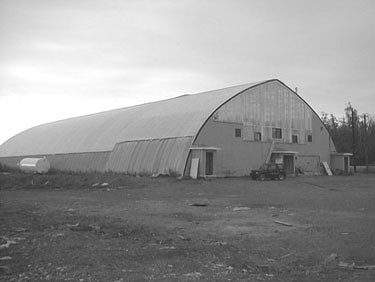
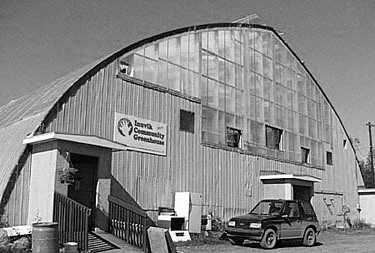

A greenhouse now on the tundra.
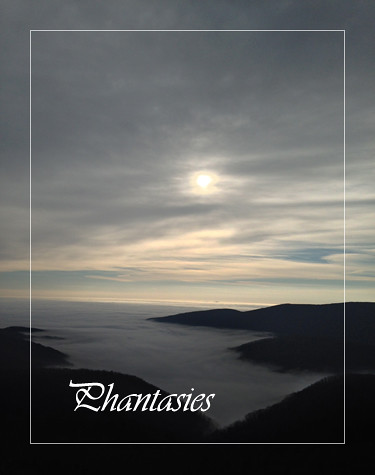
Volume XVI, Issue IXa
Phantasies
By George MacDonald, Chapter 19
In still rest, in changeless simplicity,
I bear, uninterrupted, the consciousness of the whole of Humanity within me."
~ from Schleiermachers Monologen.
. . . such a sweetness, such a grace,
In all thy speech appear,
That what to th'eye a beauteous face,
That thy tongue is to the ear."
~ Abraham Cowley, "The Innocent Ill".
The water was deep to the very edge; and I sprang from the little boat upon a soft grassy turf. The island seemed rich with a profusion of all grasses and low flowers. All delicate lowly things were most plentiful; but no trees rose skywards, not even a bush overtopped the tall grasses, except in one place near the cottage I am about to describe, where a few plants of the gum-cistus, which drops every night all the blossoms that the day brings forth, formed a kind of natural arbour. The whole island lay open to the sky and sea. It rose nowhere more than a few feet above the level of the waters, which flowed deep all around its border. Here there seemed to be neither tide nor storm. A sense of persistent calm and fulness arose in the mind at the sight of the slow, pulse-like rise and fall of the deep, clear, unrippled waters against the bank of the island, for shore it could hardly be called, being so much more like the edge of a full, solemn river. As I walked over the grass towards the cottage, which stood at a little distance from the bank, all the flowers of childhood looked at me with perfect child-eyes out of the grass. My heart, softened by the dreams through which it had passed, overflowed in a sad, tender love towards them. They looked to me like children impregnably fortified in a helpless confidence. The sun stood half-way down the western sky, shining very soft and golden; and there grew a second world of shadows amidst the world of grasses and wild flowers.
The cottage was square, with low walls, and a high pyramidal roof thatched with long reeds, of which the withered blossoms hung over all the eaves. It is noticeable that most of the buildings I saw in Fairy Land were cottages. There was no path to a door, nor, indeed, was there any track worn by footsteps in the island.
The cottage rose right out of the smooth turf. It had no windows that I could see; but there was a door in the centre of the side facing me, up to which I went. I knocked, and the sweetest voice I had ever heard said, "Come in." I entered. A bright fire was burning on a hearth in the centre of the earthern floor, and the smoke found its way out at an opening in the centre of the pyramidal roof. Over the fire hung a little pot, and over the pot bent a woman-face, the most wonderful, I thought, that I had ever beheld. For it was older than any countenance I had ever looked upon. There was not a spot in which a wrinkle could lie, where a wrinkle lay not. And the skin was ancient and brown, like old parchment. The woman's form was tall and spare: and when she stood up to welcome me, I saw that she was straight as an arrow. Could that voice of sweetness have issued from those lips of age? Mild as they were, could they be the portals whence flowed such melody? But the moment I saw her eyes, I no longer wondered at her voice: they were absolutely young--those of a woman of five-and-twenty, large, and of a clear gray. Wrinkles had beset them all about; the eyelids themselves were old, and heavy, and worn; but the eyes were very incarnations of soft light. She held out her hand to me, and the voice of sweetness again greeted me, with the single word, "Welcome." She set an old wooden chair for me, near the fire, and went on with her cooking. A wondrous sense of refuge and repose came upon me. I felt like a boy who has got home from school, miles across the hills, through a heavy storm of wind and snow. Almost, as I gazed on her, I sprang from my seat to kiss those old lips. And when, having finished her cooking, she brought some of the dish she had prepared, and set it on a little table by me, covered with a snow-white cloth, I could not help laying my head on her bosom, and bursting into happy tears. She put her arms round me, saying, "Poor child; poor child!"
As I continued to weep, she gently disengaged herself, and, taking a spoon, put some of the food (I did not know what it was) to my lips, entreating me most endearingly to swallow it. To please her, I made an effort, and succeeded. She went on feeding me like a baby, with one arm round me, till I looked up in her face and smiled: then she gave me the spoon and told me to eat, for it would do me good. I obeyed her, and found myself wonderfully refreshed. Then she drew near the fire an old-fashioned couch that was in the cottage, and making me lie down upon it, sat at my feet, and began to sing. Amazing store of old ballads rippled from her lips, over the pebbles of ancient tunes; and the voice that sang was sweet as the voice of a tuneful maiden that singeth ever from very fulness of song. The songs were almost all sad, but with a sound of comfort. One I can faintly recall. It was something like this:
Sir Aglovaile through the churchyard rode;
SING, ALL ALONE I LIE:
Little recked he where\'er he yode,
ALL ALONE, UP IN THE SKY.
Swerved his courser, and plunged with fear
ALL ALONE I LIE:
His cry might have wakened the dead men near,
ALL ALONE, UP IN THE SKY.
The very dead that lay at his feet,
Lapt in the mouldy winding-sheet.
But he curbed him and spurred him, until he stood
Still in his place, like a horse of wood,
With nostrils uplift, and eyes wide and wan;
But the sweat in streams from his fetlocks ran.
A ghost grew out of the shadowy air,
And sat in the midst of her moony hair.
In her gleamy hair she sat and wept;
In the dreamful moon they lay and slept;
The shadows above, and the bodies below,
Lay and slept in the moonbeams slow.
And she sang, like the moan of an autumn wind
Over the stubble left behind:
Alas, how easily things go wrong
A sigh too much, or a kiss too long,
And there follows a mist and a weeping rain,
And life is never the same again.
Alas, how hardly things go right!
\'Tis hard to watch on a summer night,
For the sigh will come and the kiss will stay,
And the summer night is a winter day.
\"Oh, lovely ghosts my heart is woes
To see thee weeping and wailing so.
Oh, lovely ghost,\" said the fearless knight,
\"Can the sword of a warrior set it right?
Or prayer of bedesman, praying mild,
As a cup of water a feverish child,
Sooth thee at last, in dreamless mood
To sleep the sleep a dead lady should?
Thine eyes they fill me with longing sore,
As if I had known thee for evermore.
Oh, lovely ghost, I could leave the day
To sit with thee in the moon away
If thou wouldst trust me, and lay thy head
To rest on a bosom that is not dead.\"
The lady sprang up with a strange ghost-cry,
And she flung her white ghost-arms on high:
And she laughed a laugh that was not gay,
And it lengthened out till it died away;
And the dead beneath turned and moaned,
And the yew-trees above they shuddered and groaned.
\"Will he love me twice with a love that is vain?
Will he kill the poor ghost yet again?
I thought thou wert good; but I said, and wept:
\'Can I have dreamed who have not slept?\'
And I knew, alas! or ever I would,
Whether I dreamed, or thou wert good.
When my baby died, my brain grew wild.
I awoke, and found I was with my child.\"
\"If thou art the ghost of my Adelaide,
How is it? Thou wert but a village maid,
And thou seemest an angel lady white,
Though thin, and wan, and past delight.\"
The lady smiled a flickering smile,
And she pressed her temples hard the while.
\"Thou seest that Death for a woman can
Do more than knighthood for a man.\"
\"But show me the child thou callest mine,
Is she out to-night in the ghost\'s sunshine?\"
\"In St. Peter\'s Church she is playing on,
At hide-and-seek, with Apostle John.
When the moonbeams right through the window go,
Where the twelve are standing in glorious show,
She says the rest of them do not stir,
But one comes down to play with her.
Then I can go where I list, and weep,
For good St. John my child will keep.\"
\"Thy beauty filleth the very air,
Never saw I a woman so fair.\"
\"Come, if thou darest, and sit by my side;
But do not touch me, or woe will betide.
Alas, I am weak: I might well know
This gladness betokens some further woe.
Yet come. It will come. I will bear it. I can.
For thou lovest me yet--though but as a man.\"
The knight dismounted in earnest speed;
Away through the tombstones thundered the steed,
And fell by the outer wall, and died.
But the knight he kneeled by the lady\'s side;
Kneeled beside her in wondrous bliss,
Rapt in an everlasting kiss:
Though never his lips come the lady nigh,
And his eyes alone on her beauty lie.
All the night long, till the cock crew loud,
He kneeled by the lady, lapt in her shroud.
And what they said, I may not say:
Dead night was sweeter than living day.
How she made him so blissful glad
Who made her and found her so ghostly sad,
I may not tell; but it needs no touch
To make them blessed who love so much.
Come every night, my ghost, to me;
And one night I will come to thee.
\'Tis good to have a ghostly wife:
She will not tremble at clang of strife;
She will only hearken, amid the din,
Behind the door, if he cometh in.\"
And this is how Sir Aglovaile
Often walked in the moonlight pale.
And oft when the crescent but thinned the gloom,
Full orbed moonlight filled his room;
And through beneath his chamber door,
Fell a ghostly gleam on the outer floor;
And they that passed, in fear averred
That murmured words they often heard.
\'Twas then that the eastern crescent shone
Through the chancel window, and good St. John
Played with the ghost-child all the night,
And the mother was free till the morning light,
And sped through the dawning night, to stay
With Aglovaile till the break of day.
And their love was a rapture, lone and high,
And dumb as the moon in the topmost sky.
One night Sir Aglovaile, weary, slept
And dreamed a dream wherein he wept.
A warrior he was, not often wept he,
But this night he wept full bitterly.
He woke--beside him the ghost-girl shone
Out of the dark: \'twas the eve of St. John.
He had dreamed a dream of a still, dark wood,
Where the maiden of old beside him stood;
But a mist came down, and caught her away,
And he sought her in vain through the pathless day,
Till he wept with the grief that can do no more,
And thought he had dreamt the dream before.
From bursting heart the weeping flowed on;
And lo! beside him the ghost-girl shone;
Shone like the light on a harbour\'s breast,
Over the sea of his dream\'s unrest;
Shone like the wondrous, nameless boon,
That the heart seeks ever, night or noon:
Warnings forgotten, when needed most,
He clasped to his bosom the radiant ghost.
She wailed aloud, and faded, and sank.
With upturn\'d white face, cold and blank,
In his arms lay the corpse of the maiden pale,
And she came no more to Sir Aglovaile.
Only a voice, when winds were wild,
Sobbed and wailed like a chidden child.
Alas, how easily things go wrong!
A sigh too much, or a kiss too long,
And there follows a mist and a weeping rain,
And life is never the same again.
This was one of the simplest of her songs, which, perhaps, is the cause of my being able to remember it better than most of the others. While she sung, I was in Elysium, with the sense of a rich soul upholding, embracing, and overhanging mine, full of all plenty and bounty. I felt as if she could give me everything I wanted; as if I should never wish to leave her, but would be content to be sung to and fed by her, day after day, as years rolled by. At last I fell asleep while she sang.
When I awoke, I knew not whether it was night or day. The fire had sunk to a few red embers, which just gave light enough to show me the woman standing a few feet from me, with her back towards me, facing the door by which I had entered. She was weeping, but very gently and plentifully. The tears seemed to come freely from her heart. Thus she stood for a few minutes; then, slowly turning at right angles to her former position, she faced another of the four sides of the cottage. I now observed, for the first time, that here was a door likewise; and that, indeed, there was one in the centre of every side of the cottage.
When she looked towards the second door, her tears ceased to flow, but sighs took their place. She often closed her eyes as she stood; and every time she closed her eyes, a gentle sigh seemed to be born in her heart, and to escape at her lips. But when her eyes were open, her sighs were deep and very sad, and shook her whole frame. Then she turned towards the third door, and a cry as of fear or suppressed pain broke from her; but she seemed to hearten herself against the dismay, and to front it steadily; for, although I often heard a slight cry, and sometimes a moan, yet she never moved or bent her head, and I felt sure that her eyes never closed. Then she turned to the fourth door, and I saw her shudder, and then stand still as a statue; till at last she turned towards me and approached the fire. I saw that her face was white as death. But she gave one look upwards, and smiled the sweetest, most child-innocent smile; then heaped fresh wood on the fire, and, sitting down by the blaze, drew her wheel near her, and began to spin. While she spun, she murmured a low strange song, to which the hum of the wheel made a kind of infinite symphony. At length she paused in her spinning and singing, and glanced towards me, like a mother who looks whether or not her child gives signs of waking. She smiled when she saw that my eyes were open. I asked her whether it was day yet. She answered, "It is always day here, so long as I keep my fire burning."
I felt wonderfully refreshed; and a great desire to see more of the island awoke within me. I rose, and saying that I wished to look about me, went towards the door by which I had entered.
Stay a moment," said my hostess, with some trepidation in her voice. "Listen to me. You will not see what you expect when you go out of that door. Only remember this: whenever you wish to come back to me, enter wherever you see this mark."
She held up her left hand between me and the fire. Upon the palm, which appeared almost transparent, I saw, in dark red, a mark like this ---&; which I took care to fix in my mind.
She then kissed me, and bade me good-bye with a solemnity that awed me; and bewildered me too, seeing I was only going out for a little ramble in an island, which I did not believe larger than could easily be compassed in a few hours' walk at most. As I went she resumed her spinning.
I opened the door, and stepped out. The moment my foot touched the smooth sward, I seemed to issue from the door of an old barn on my father's estate, where, in the hot afternoons, I used to go and lie amongst the straw, and read. It seemed to me now that I had been asleep there. At a little distance in the field, I saw two of my brothers at play. The moment they caught sight of me, they called out to me to come and join them, which I did; and we played together as we had done years ago, till the red sun went down in the west, and the gray fog began to rise from the river. Then we went home together with a strange happiness. As we went, we heard the continually renewed larum of a landrail in the long grass. One of my brothers and I separated to a little distance, and each commenced running towards the part whence the sound appeared to come, in the hope of approaching the spot where the bird was, and so getting at least a sight of it, if we should not be able to capture the little creature. My father's voice recalled us from trampling down the rich long grass, soon to be cut down and laid aside for the winter. I had quite forgotten all about Fairy Land, and the wonderful old woman, and the curious red mark.
My favourite brother and I shared the same bed. Some childish dispute arose between us; and our last words, ere we fell asleep, were not of kindness, notwithstanding the pleasures of the day. When I woke in the morning, I missed him. He had risen early, and had gone to bathe in the river. In another hour, he was brought home drowned. Alas! alas! if we had only gone to sleep as usual, the one with his arm about the other! Amidst the horror of the moment, a strange conviction flashed across my mind, that I had gone through the very same once before.
I rushed out of the house, I knew not why, sobbing and crying bitterly. I ran through the fields in aimless distress, till, passing the old barn, I caught sight of a red mark on the door. The merest trifles sometimes rivet the attention in the deepest misery; the intellect has so little to do with grief. I went up to look at this mark, which I did not remember ever to have seen before. As I looked at it, I thought I would go in and lie down amongst the straw, for I was very weary with running about and weeping. I opened the door; and there in the cottage sat the old woman as I had left her, at her spinning-wheel.
I did not expect you quite so soon," she said, as I shut the door behind me. I went up to the couch, and threw myself on it with that fatigue wherewith one awakes from a feverish dream of hopeless grief.
The old woman sang:
The great sun, benighted,
May faint from the sky;
But love, once uplighted,
Will never more die.
Form, with its brightness,
From eyes will depart:
It walketh, in whiteness,
The halls of the heart.
Ere she had ceased singing, my courage had returned. I started from the couch, and, without taking leave of the old woman, opened the door of Sighs, and sprang into what should appear.
I stood in a lordly hall, where, by a blazing fire on the hearth, sat a lady, waiting, I knew, for some one long desired. A mirror was near me, but I saw that my form had no place within its depths, so I feared not that I should be seen. The lady wonderfully resembled my marble lady, but was altogether of the daughters of men, and I could not tell whether or not it was she.
It was not for me she waited. The tramp of a great horse rang through the court without. It ceased, and the clang of armour told that his rider alighted, and the sound of his ringing heels approached the hall. The door opened; but the lady waited, for she would meet her lord alone. He strode in: she flew like a home-bound dove into his arms, and nestled on the hard steel. It was the knight of the soiled armour. But now the armour shone like polished glass; and strange to tell, though the mirror reflected not my form, I saw a dim shadow of myself in the shining steel.
O my beloved, thou art come, and I am blessed."
Her soft fingers speedily overcame the hard clasp of his helmet; one by one she undid the buckles of his armour; and she toiled under the weight of the mail, as she would carry it aside. Then she unclasped his greaves, and unbuckled his spurs; and once more she sprang into his arms, and laid her head where she could now feel the beating of his heart. Then she disengaged herself from his embrace, and, moving back a step or two, gazed at him. He stood there a mighty form, crowned with a noble head, where all sadness had disappeared, or had been absorbed in solemn purpose. Yet I suppose that he looked more thoughtful than the lady had expected to see him, for she did not renew her caresses, although his face glowed with love, and the few words he spoke were as mighty deeds for strength; but she led him towards the hearth, and seated him in an ancient chair, and set wine before him, and sat at his feet.
I am sad," he said, "when I think of the youth whom I met twice in the forests of Fairy Land; and who, you say, twice, with his songs, roused you from the death-sleep of an evil enchantment. There was something noble in him, but it was a nobleness of thought, and not of deed. He may yet perish of vile fear."
Ah!" returned the lady, "you saved him once, and for that I thank you; for may I not say that I somewhat loved him? But tell me how you fared, when you struck your battle-axe into the ash-tree, and he came and found you; for so much of the story you had told me, when the beggar-child came and took you away."
As soon as I saw him," rejoined the knight, "I knew that earthly arms availed not against such as he; and that my soul must meet him in its naked strength. So I unclasped my helm, and flung it on the ground; and, holding my good axe yet in my hand, gazed at him with steady eyes. On he came, a horror indeed, but I did not flinch. Endurance must conquer, where force could not reach. He came nearer and nearer, till the ghastly face was close to mine. A shudder as of death ran through me; but I think I did not move, for he seemed to quail, and retreated. As soon as he gave back, I struck one more sturdy blow on the stem of his tree, that the forest rang; and then looked at him again. He writhed and grinned with rage and apparent pain, and again approached me, but retreated sooner than before. I heeded him no more, but hewed with a will at the tree, till the trunk creaked, and the head bowed, and with a crash it fell to the earth. Then I looked up from my labour, and lo! the spectre had vanished, and I saw him no more; nor ever in my wanderings have I heard of him again."
Well struck! well withstood! my hero," said the lady.
But," said the knight, somewhat troubled, "dost thou love the youth still?"
Ah!" she replied, "how can I help it? He woke me from worse than death; he loved me. I had never been for thee, if he had not sought me first. But I love him not as I love thee. He was but the moon of my night; thou art the sun of my clay, O beloved."
Thou art right," returned the noble man. "It were hard, indeed, not to have some love in return for such a gift as he hath given thee. I, too, owe him more than words can speak."
Humbled before them, with an aching and desolate heart, I yet could not restrain my words:
Let me, then, be the moon of thy night still, O woman! And when thy day is beclouded, as the fairest days will be, let some song of mine comfort thee, as an old, withered, half-forgotten thing, that belongs to an ancient mournful hour of uncompleted birth, which yet was beautiful in its time."
They sat silent, and I almost thought they were listening. The colour of the lady's eyes grew deeper and deeper; the slow tears grew, and filled them, and overflowed. They rose, and passed, hand in hand, close to where I stood; and each looked towards me in passing. Then they disappeared through a door which closed behind them; but, ere it closed, I saw that the room into which it opened was a rich chamber, hung with gorgeous arras. I stood with an ocean of sighs frozen in my bosom. I could remain no longer. She was near me, and I could not see her; near me in the arms of one loved better than I, and I would not see her, and I would not be by her. But how to escape from the nearness of the best beloved? I had not this time forgotten the mark; for the fact that I could not enter the sphere of these living beings kept me aware that, for me, I moved in a vision, while they moved in life. I looked all about for the mark, but could see it nowhere; for I avoided looking just where it was. There the dull red cipher glowed, on the very door of their secret chamber. Struck with agony, I dashed it open, and fell at the feet of the ancient woman, who still spun on, the whole dissolved ocean of my sighs bursting from me in a storm of tearless sobs. Whether I fainted or slept, I do not know; but, as I returned to consciousness, before I seemed to have power to move, I heard the woman singing, and could distinguish the words:
O light of dead and of dying days!
O Love! in thy glory go,
In a rosy mist and a moony maze,
O'er the pathless peaks of snow.
But what is left for the cold gray soul,
That moans like a wounded dove?
One wine is left in the broken bowl!--
'Tis--To Love, and Love and Love and Love.
Now I could weep. When she saw me weeping, she sang:
Better to sit at the waters' birth,
Than a sea of waves to win;
To live in the love that floweth forth,
Than the love that cometh in.
Be thy heart a well of love, my child,
Flowing, and free, and sure;
For a cistern of love, though undefiled,
Keeps not the spirit pure.
I rose from the earth, loving the white lady as I had never loved her before.
Then I walked up to the door of Dismay, and opened it, and went out. And lo! I came forth upon a crowded street, where men and women went to and fro in multitudes. I knew it well; and, turning to one hand, walked sadly along the pavement. Suddenly I saw approaching me, a little way off, a form well known to me (well-known!--alas, how weak the word!) in the years when I thought my boyhood was left behind, and shortly before I entered the realm of Fairy Land. Wrong and Sorrow had gone together, hand-in-hand as it is well they do.
Unchangeably dear was that face. It lay in my heart as a child lies in its own white bed; but I could not meet her.
Anything but that," I said, and, turning aside, sprang up the steps to a door, on which I fancied I saw the mystic sign. I entered--not the mysterious cottage, but her home. I rushed wildly on, and stood by the door of her room.
She is out," I said, "I will see the old room once more."
I opened the door gently, and stood in a great solemn church. A deep-toned bell, whose sounds throbbed and echoed and swam through the empty building, struck the hour of midnight. The moon shone through the windows of the clerestory, and enough of the ghostly radiance was diffused through the church to let me see, walking with a stately, yet somewhat trailing and stumbling step, down the opposite aisle, for I stood in one of the transepts, a figure dressed in a white robe, whether for the night, or for that longer night which lies too deep for the day, I could not tell. Was it she? and was this her chamber? I crossed the church, and followed. The figure stopped, seemed to ascend as it were a high bed, and lay down. I reached the place where it lay, glimmering white. The bed was a tomb. The light was too ghostly to see clearly, but I passed my hand over the face and the hands and the feet, which were all bare. They were cold--they were marble, but I knew them. It grew dark. I turned to retrace my steps, but found, ere long, that I had wandered into what seemed a little chapel. I groped about, seeking the door. Everything I touched belonged to the dead. My hands fell on the cold effigy of a knight who lay with his legs crossed and his sword broken beside him. He lay in his noble rest, and I lived on in ignoble strife. I felt for the left hand and a certain finger; I found there the ring I knew: he was one of my own ancestors. I was in the chapel over the burial-vault of my race. I called aloud: "If any of the dead are moving here, let them take pity upon me, for I, alas! am still alive; and let some dead woman comfort me, for I am a stranger in the land of the dead, and see no light." A warm kiss alighted on my lips through the dark. And I said, "The dead kiss well; I will not be afraid." And a great hand was reached out of the dark, and grasped mine for a moment, mightily and tenderly. I said to myself: "The veil between, though very dark, is very thin."
Groping my way further, I stumbled over the heavy stone that covered the entrance of the vault: and, in stumbling, descried upon the stone the mark, glowing in red fire. I caught the great ring. All my effort could not have moved the huge slab; but it opened the door of the cottage, and I threw myself once more, pale and speechless, on the couch beside the ancient dame. She sang once more:
Thou dreamest: on a rock thou art,
High o'er the broken wave;
Thou fallest with a fearful start
But not into thy grave;
For, waking in the morning's light,
Thou smilest at the vanished night
So wilt thou sink, all pale and dumb,
Into the fainting gloom;
But ere the coming terrors come,
Thou wak'st--where is the tomb?
Thou wak'st--the dead ones smile above,
With hovering arms of sleepless love.
She paused; then sang again:
We weep for gladness, weep for grief;
The tears they are the same;
We sigh for longing, and relief;
The sighs have but one name,
And mingled in the dying strife,
Are moans that are not sad
The pangs of death are throbs of life,
Its sighs are sometimes glad.
The face is very strange and white:
It is Earth's only spot
That feebly flickers back the light
The living seeth not.
I fell asleep, and slept a dreamless sleep, for I know not how long. When I awoke, I found that my hostess had moved from where she had been sitting, and now sat between me and the fourth door.
I guessed that her design was to prevent my entering there. I sprang from the couch, and darted past her to the door. I opened it at once and went out. All I remember is a cry of distress from the woman: "Don't go there, my child! Don't go there!" But I was gone.
I knew nothing more; or, if I did, I had forgot it all when I awoke to consciousness, lying on the floor of the cottage, with my head in the lap of the woman, who was weeping over me, and stroking my hair with both hands, talking to me as a mother might talk to a sick and sleeping, or a dead child. As soon as I looked up and saw her, she smiled through her tears; smiled with withered face and young eyes, till her countenance was irradiated with the light of the smile. Then she bathed my head and face and hands in an icy cold, colourless liquid, which smelt a little of damp earth. Immediately I was able to sit up. She rose and put some food before me. When I had eaten, she said: "Listen to me, my child. You must leave me directly!"
Leave you!" I said. "I am so happy with you. I never was so happy in my life."
But you must go," she rejoined sadly. "Listen! What do you hear?"
I hear the sound as of a great throbbing of water."
Ah! you do hear it? Well, I had to go through that door--the door of the Timeless" (and she shuddered as she pointed to the fourth door)--"to find you; for if I had not gone, you would never have entered again; and because I went, the waters around my cottage will rise and rise, and flow and come, till they build a great firmament of waters over my dwelling. But as long as I keep my fire burning, they cannot enter. I have fuel enough for years; and after one year they will sink away again, and be just as they were before you came. I have not been buried for a hundred years now." And she smiled and wept.
Alas! alas!" I cried. "I have brought this evil on the best and kindest of friends, who has filled my heart with great gifts."
Do not think of that," she rejoined. "I can bear it very well. You will come back to me some day, I know. But I beg you, for my sake, my dear child, to do one thing. In whatever sorrow you may be, however inconsolable and irremediable it may appear, believe me that the old woman in the cottage, with the young eyes" (and she smiled), "knows something, though she must not always tell it, that would quite satisfy you about it, even in the worst moments of your distress.
Now you must go."
But how can I go, if the waters are all about, and if the doors all lead into other regions and other worlds?"
This is not an island," she replied; "but is joined to the land by a narrow neck; and for the door, I will lead you myself through the right one."
She took my hand, and led me through the third door; whereupon I found myself standing in the deep grassy turf on which I had landed from the little boat, but upon the opposite side of the cottage. She pointed out the direction I must take, to find the isthmus and escape the rising waters.
Then putting her arms around me, she held me to her bosom; and as I kissed her, I felt as if I were leaving my mother for the first time, and could not help weeping bitterly. At length she gently pushed me away, and with the words, "Go, my son, and do something worth doing," turned back, and, entering the cottage, closed the door behind her.
I felt very desolate as I went.
(to be continued)
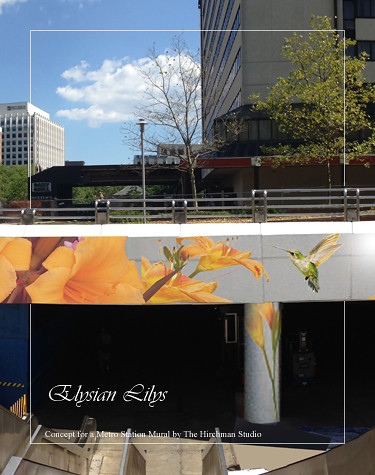
Elysian Lilys, a mural proposal for a Metropolitan Washington Metro Station.
Murals for Public Spaces
[click to read]
Harry Weese actually created the spaces of Washington’s Metro as a Brutalism/Minimalist statement. He specified that their be no murals, but four decades later the imposing fearsomeness of the spaces had the leadership of Bethesda, Maryland creating public art.
Was it successful? Our studio submitted a very natural floral mural... a continuation of the theme began in the Hollyhocks Mural in Charlottesville. Our goal was indeed to overlay the stark entrance/bus shed with a natural imagery to create an inviting space. I joked to my colleagues: “This won't win. Bethesda Arts likes stark geometrics.”(read more)
Everyday Life in Modern Coruscant
Asian Megacities as Political Theater
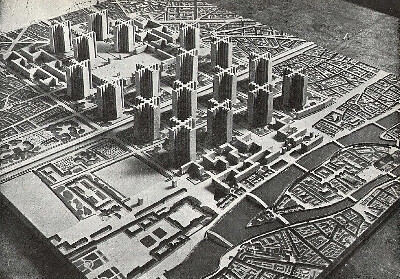
What Le Corbusier would have wrought in Paris has become the new reality of Bejing and Shanghai.
Le Corbusier once wrote of his Plan Voisin for Paris: “Since 1922 [for the past 42 years] I have continued to work, in general and in detail, on the problem of Paris. Everything has been made public. The City Council has never contacted me. It calls me ‘Barbarian’!” -- Le Corbusier’s writings, p. 207.
Fast forward to the Twenty-first Century and Shanghai [Le Corbusier on steroids]. It all seems like the realization of the fictional Coruscant from Star Wars... a completely urban environment that stretches as far as the eye can see. The entire planet of Coruscant is one continual city.
Guy Sorman discusses the rise of Asian 'Super Megagopolises' [click to read] in City Journal. Looking at the Mega-model of Shanghai, one could begin to wonder: "can Coruscant be that far off." Sorman points out, however, that Shanghai is largely a political creation...designed to create the impression that China is ready for business with the world. [1.]
Every day the city teems with life and every night the workers necessary to make it function vacate the pristine city. It is like Disney World, where the 'cast members' descend into 'Utilidor,' remove their costumes, and disappear to homes elsewhere.
For Shanghai workers, 'homes elsewhere' often means crowded and substandard. Just as China's factories are seldom seen by Westerners, those who maintain the stage for world commerce live in a vastly different world than the one they 'portray' in their 'day jobs.'
Or perhaps, the Death Star in Star Wars is a better analogy. Its scale is way beyond human. It is intended to convey a sense of awe. Might we be looking at the work of some latter day Nimrod, seeking to elevate himself to the heavens?
Sorman points out how the mad rush into the 21st Century has obliterated the traditional spaces of Shanghai and Beijing, which were much more human in size and scate. Again Star Wars comes to mind. Green beautiful planets like Naboo and Alderon risk elimination as the Empire expands its grasp.

This scale model of Shanghai dwarfs the people in the room...
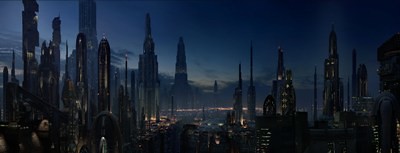
...and calls to mind the fictional city of Coruscant.
In the 'Sixties America sought to 'remake' her major cities. Le Corbusier style housing blocks were constructed to elevate the urban poor. Many of these 'projects' have since been torn down. While we were building them Moscow was building similar blocks of apartments. Today in Moscow, urban youths flock to the rooftops. [2.] Called 'Roofers,' these young people seek the rooftops simply for the openness and the view.
How to Return to the Village
Returning Government to the People in the 'Audience'
Nineteenth Century America was a nation of villages. Great centers of commerce existed, but they were fed by a vibrant countryside. When Thomas Jefferson created his ideal 'Academic Village' to house the University of Virginia he purposefully left one side open to the surrounding agricultural land. From the steps of the Rotunda one could look upon the rolling hills of Albemarle County.
Architect Stanford White convinced the University to fill the void with Old Cabell Hall a long time ago. The recently completed South Lawn attempts to recreate a space leading off into the trees of Charlottesville. The challenge of getting back to the garden is ever before us. Rooftop Gardens [click to read] offer one method of getting people and open spaces together. Reclaiming existing environments is another. Aging strip malls could be recycled into village centers for the surrounding suburban homes, offering a place residents could walk or bicycle to. Vacant lots and neglected riverfronts can become parks and gardens.
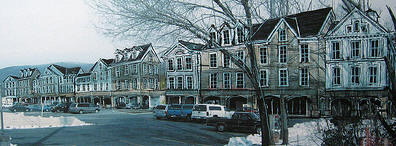
Proposed Renewal of the Crozet Shopping Center.
Drawing created by the Kirchman Studio.
Suburb bashing has always been a fashionable intellectual pastime.That is one reason I like Robert A. M. Stern. He sees the reasons people seek out single family dwellings of a traditional form. I have a friend who lives on the upper West side and his penthouse with a view of the Hudson is very nice but give me my gardens.People put up with the wretched infrastructure overload and strip centers because the village is still appealing. The residential areas become landscaped oasis for their residents. Kids play outside the house in view of the kitchen window. People visit at the back fence. Moreover the suburbs are seen by their dwellers as affirming opportunity and safety. If people had no emotion for their homes they would be fine with Le Courbusier type high rises but that is simply not the case.The problem is really one of infrastructure and public space [or lack therof]. Strip malls and box stores create a sterile wasteland but they may become the village centers of the future.
Time magazine once featured a piece called 'Repurposing Suburbs' which shows some fine examples of recreating this type of public space. This Crozet project turns a tired strip mall into a village center. One cannot wait for Crozet's redesigner to get his creative hands on some of the new "Town Center" projects which are now just collections of big box stores. Some time ago I drew a concept where the CSX tracks between Staunton and Charlottesville became a light rail line connecting Staunton, Fishersville, Waynesboro, Crozet, Ivy, The University of Virginia Medical Center and Downtown Charlottesville. The result would be a series of village centers and a better utilization of existing infrastructure.
City Journal's writers draw conflicting conclusions. Houston is touted as encouraging its middle class while Gotham offers limited options. Dense urban areas do tend to create energy efficiency. The trick is to see opportunities to improve the communities we have already created.That would certainly involve offering condominiums and a pedestrian friendly center to suburban communities and reclaiming all those wonderful old low density neighborhoods of our cities.
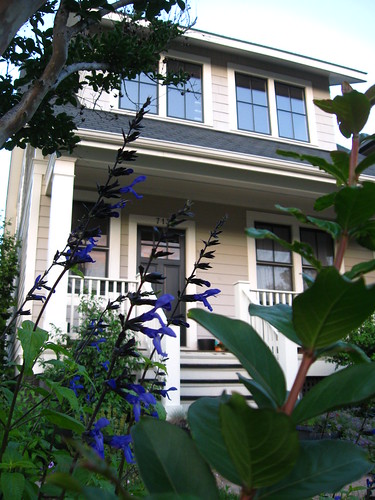
Front Yard garden, Arlington, Virginia. Photo by Bob Kirchman.

Front Porch, Arlington, Virginia. Photo by Bob Kirchman.
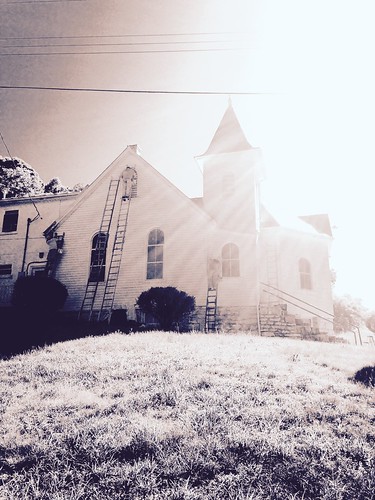
Workers paint the Ebenezer Presbyterian Church in Rockbridge County, Virginia. Photo by Bob Kirchman.
Traditional Irish Dancing
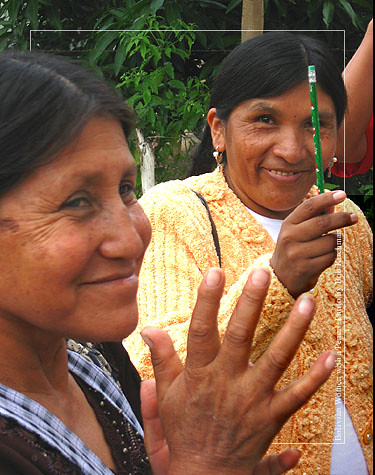
Ladies in Santa Cruz, Bolivia.
A Case for Vision
© 2017 The Kirchman Studio.
When William Wilberforce had ended the slave trade in the British Empire, he had thrown the city of Bristol into economic depression. The port there was heavily devoted to that wretched business and suffered heavily when it was brought to a sudden halt. The unintended consequence had been a rise in children condemned to a life of poverty. Ending the vile business of enslaving Africa's children had resulting in England's society spurning the needs of her own. Men like Charles Dickens and George Müller had seen the wretched street urchins most people despised as jewels to be polished. Müller, relying solely on Divine provision, built five large houses for Orphans at Ashley Downs in Bristol, England. He trained the girls to be nurses, teachers, clerical workers and domestics. He apprenticed all the boys in various trades. He was excoriated for training these unwanted children "above their station." He ignored the critics.
What is often forgotten in the telling of this story is the means by which G-d provided. In 1831, 24 year old Isambard Kingdom Brunel was awarded a contract to bridge the Avon Gorge. It was the dream of a prosperous wine merchant who provided the initial funding. The completed bridge would become the symbol of the city, but lack of funding dogged the project. It took thirty years to complete it. For years only the towers stood completed. In 1833 Brunel began work on the Great Western Railway, which would become the instrument of Bristol's economic revitalization. The nicknames: "Great Way Round" and "G-d's Wonderful Railway" seem to describe well Brunel's great work. Brunel's vision extended beyond the shores of England. He envisioned the creation of a highway of commerce all the way to the Americas! Harnessing the power of steam, he built the great ships to make hs vision a reality. Muller's prayer for provision found answer in the accomplishment of Brunel's vision!
America today is in sore want of leadership like that of Brunel. When a White House spokesman spins the tale that a shrinking employment is a good thing he is delusional. One needs only to look at those countries where this low employment is actually the case to see the madness of such thinking. Visiting Santa Cruz, Bolivia, I am struck with the contrasts. Indeed you can go into the Hipermaxi (a store that resembles a Super Wal Mart) and buy a wide variety of products. Within the inner rings of the great city there are indeed a variety market based businesses. You can stop in at the Hotel Cortez and enjoy a scrumptious buffet (in the company of the city's drug dealers); But travel a few rings out, and the world changes. Here there is little commerce, save a few small markets and ladies selling food on the street. You've just traveled from where the income is measured in thousands of Bolivianos to where it is measured in Hundreds. The plan is laid out for large avenues, but the paving abruptly ends. There is no water and sewer, only an open canal of sorts down the avenue. The smell is overpowering at times.
Turning off of a roughly poured concrete avenue, one finds oneself on a street of mud. It takes some skillful driving to avoid being mired. Here one sees the result of limited resources in a Socialist state. The reason we are here is because years ago, an RN from Charlottesville, Virginia saw the lack of care in government hospitals and started her own. We are working on a house for her head nurse. The compound where we are working is in the outer rings of the city. There is electricity (wire is fairly cheap to string), but the compound had to be provided with its own clean well and septic system. There is a water plant in Santa Cruz, its architecture suggests that it was been constructed in the late 'sixties and its perimiter is heavily guarded by men in riot gear. The plant only appears to provide service within the inner rings. Wherever we go in the city, we follow the good travel advice to avoid the water. We use a lot of hand sanitizer. In spite of all precautions, I still become violently ill. Such is the state of a part of the world 'freed' from meaningful commerce! If one thinks the world will be cleaner for the elimination of industry, one only needs to look at parts of the world where there is little and take heed. Land around the city is often cleared by burning it off, resulting in an acrid smoke that hangs over the area. The best cure for Marxist/Socialist Gaian thinkers in the developed world might just be for them to live in the outer rings of the society their philosophies have actually created. Sadly, such societies tend to create their own elite, safely within the rings closest to the Hipermaxi. That is where the Elite Socialists of our own country tend to gather. There is a market, of sorts, that exists because THEY have money and wants, but the resources for caring for the vast population are stretched woefully thin. Doctors in state hospitals are paid by the government, but drugs are expensive and patients must pay for them. A poor family may obtain surgery for their child but the poor child will have no pain medication.
My RN friend initially gathered donated medications and equipment to send to the state childrens' hospital. She was shocked to find that hospital staff were charging patients for it anyway. Those with money in such a society avoid the government hospitals like the plague, and seek care at private institutions. My friend was able to purchase a hospital from one such practice and turned it into Mission of Hope Bolivia, which provides compassionate care to Santa Cruz's poorest. Outside of Santa Cruz, one sees the true plight of 'minorities' when they are not a voting block to be bought. People of Inca ancestory often live in the deepest poverty and my friend has started another clinic in the city of Sucre especially to care for them. On Sunday, we visit a small church in the outermost part of the city. I am struck by the beauty of the worship offered by the poorest of the poor. Here in the midst of such a bleak landscape, the ministry of the Gospel creates an oasis of hope.
Much closer to the United States, one has only to look at Cuba and Haiti to see the results of the 'freedom' created by lack of industry. Haiti's mountainsides have been stripped of vegetation by people living on the edge of subsistence. Michael Moore may think Cuba has the best healthcare system in the world, but I would have to ask him why it is that children there are going blind for lack of simple basic nutriition? Next week THYME will look at the promise and potential of America and suggest a vision for her renewal and her future. We will look at the amazing technological advances and robust agriculture of a small nation the size of New Jersey. Taking our cue from Wayne Grudem and Barry Asmus In their book The Poverty of Nations [click to read], we will paint a vision for an American Civilization revitalized by the principles they have laid out for us.
(to be Continued).

It feels a bit like a Super Walmart, but it has a personality that is uniquely Bolivian.

A dancer moves with the music to add visual richness to worship. The church is in Santa Cruz's poorest neighborhood.
See more at Bob's Bolivia Journal [click to read].
Runaway Train
By M. K. Hand
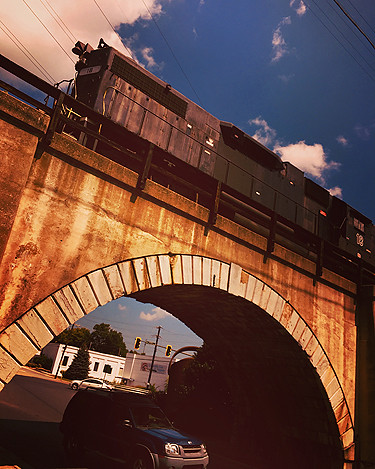
Engine 18 of the Buckingham Branch Railroad makes its way through Staunton, Virginia headed to Clifton Forge. Photo by Bob Kirchman.
From the moment we are born, we are on a collision course. By the time we take our first breaths, we are aboard a runaway train, with absolutely no hope of stopping it, getting off, or arriving at a safe destination. When Adam and Eve made the choice they did that separated them from relationship with God, they set the course for all mankind, a course of struggle, heartache, calamity, and hopelessness.
If the story ended there, it would be a horrible, hopeless tragedy. There would be no need to care, plan, live peaceably, have excitement, or set goals if the end result was too horrible to even think about. But, the story doesn’t end there.
God is the Conductor who can stop that doomed train. But, if Adam and Eve disconnected our only means of communication, how in the world do we even tell Him we want off that hellish ride? The only answer to that question would be to find another way to communicate with Him. We have to grasp for the hope that the notion might even be possible. Then, we hear a whisper in our souls that He’s left us a note, a set of instructions of sorts, for how to get off the train. The whisper grows louder as we read the note, the one that says “Bible” on it. We roll the words around in our brains like loose seeds in a packet. The more we roll those seeds of truth around, the more they spill out and begin to fall on the fertile soil of our souls. They take root. Then, like the bud bursting forth in Spring, there is the blossom of understanding that Jesus is the only way to reach the Father. We find out that He has already taken that terrible ride for us...He actually went in our place. He bridged the broken line of communication with the Conductor by paying for our tickets off that train long before we even existed and needed it.
That’s exactly what He accomplished with the Cross. He bought our way off the train to nothingness and despair. He put us on a footpath that we can navigate with His help, and He has promised to be there no matter if the path is rain-soaked or sun-dappled, rocky, or carpeted in clover. He’s even promised to give us a leg up if we tumble into a hole and a hand up if we trip and fall.
When our hearts finally embrace just what He has done, our lives become less about plotting in vain what we can do to save ourselves, and more about the joy in and adoration for the One who has already done it all for us. We were stuck on that train, then He offered to take us off with the extension of His hand. All we have to do is take it, and walk the footpath beside Him.
Have a blessed day. ~ mkh
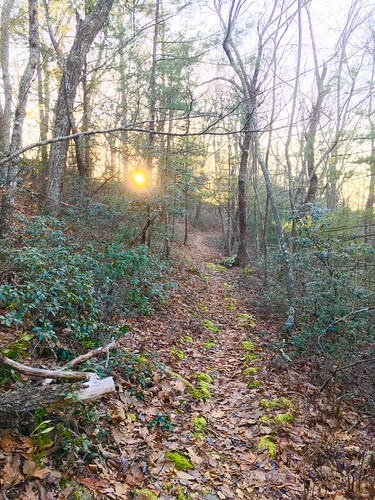
Footpath. Photo by Bob Kirchman.

Footbridge in Nepal. Photo by Giri.
Little House Mountain
A Wonderland in Rockbridge County, VA

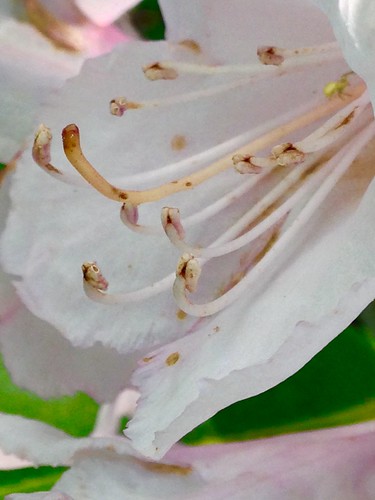

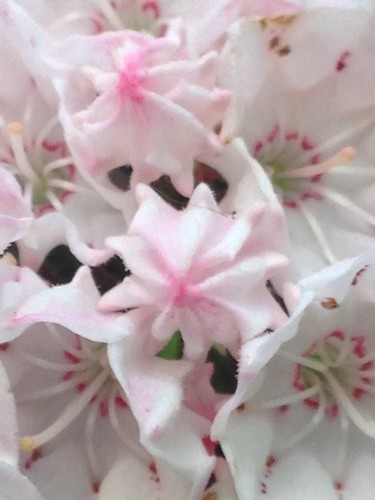

The summit of Little House Mountain is a veritable garden.
Photos by bob Kirchman.
The Ruins of Cair Paravel
Rock Formations Inspire Imagination
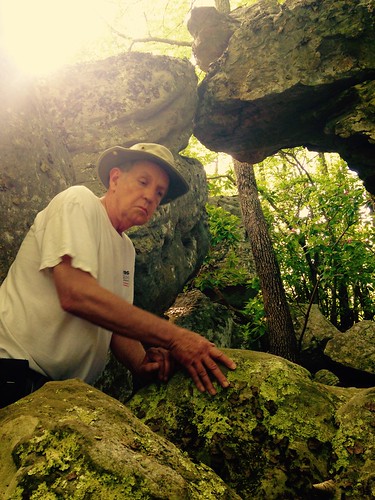
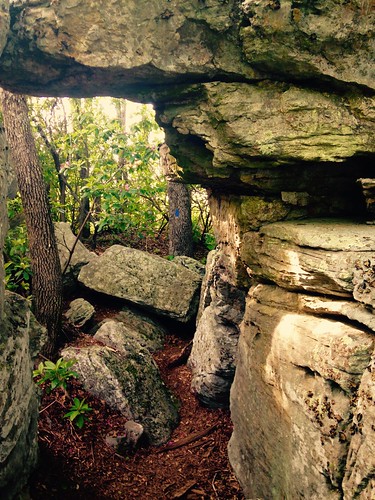
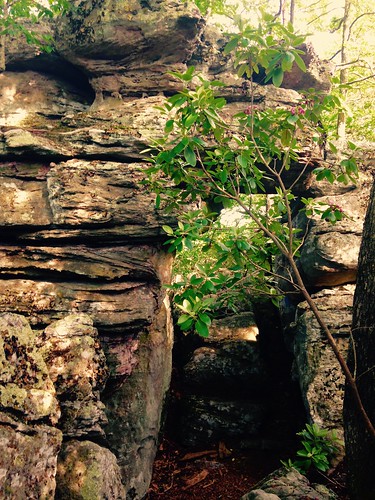
At the summit of Little House Mountain are these wonderful rock formations that call to mind Narnia's Cair Paravel!
Photos by Bob Kirchman.
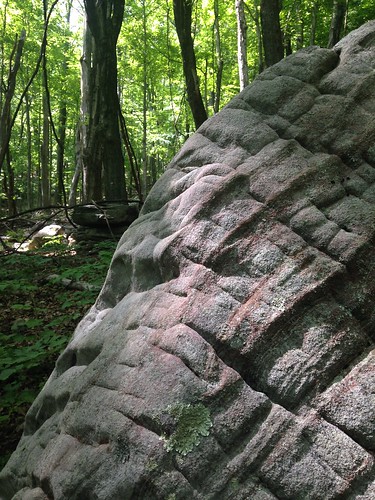
Sunset Over House Mountain
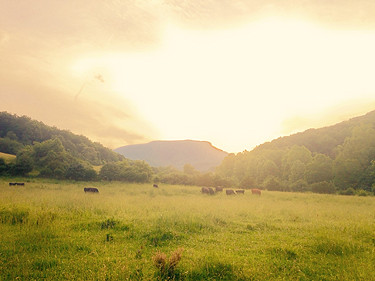
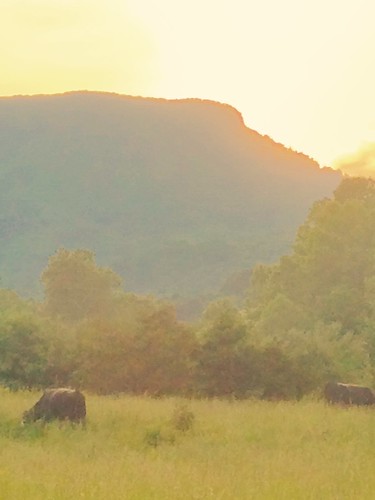
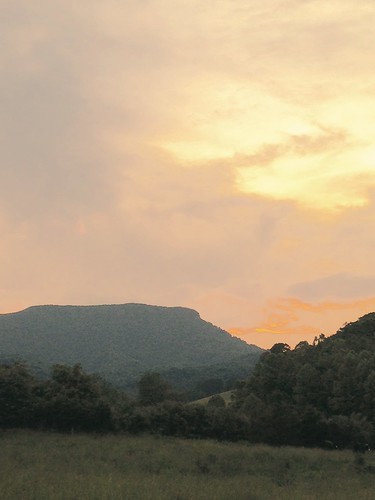
Photos by Bob Kirchman.
